Remembering Lieutenant Anthony Jovic, 20 Years After the 9/11 Attacks
September 9, 2021 - On the 20th anniversary of the attack on the World Trade Center, we remember the lives lost that fateful day, including that of Lieutenant Anthony Jovic, the son of Croatian immigrants, who died at age 39.
On a date like today, but 20 years ago, the world shook at the news of the terrorist attack on the Twin Towers in New York City. The shocking images went around the world live and on all the news on the planet. The world surely changed that day, and twenty years later the memory is still present. Moreover, after the recent events in Afghanistan, with the official withdrawal of US troops in Kabul and the installation of the new Taliban government, it has been weeks of reflection for people all over the planet after 20 years that ended a failed war.
But today, beyond the events that occurred as a consequence, serves to pay tribute to the civilians who lost their lives that day, as well as the hundreds of firefighters who tried to save them. In addition to the nearly 25,000 injured, the attack carried out by the terrorist organization Al Qaeda claimed a total of 2,977 victims, including 343 firefighters. And among those firefighters was Anthony Jovic.
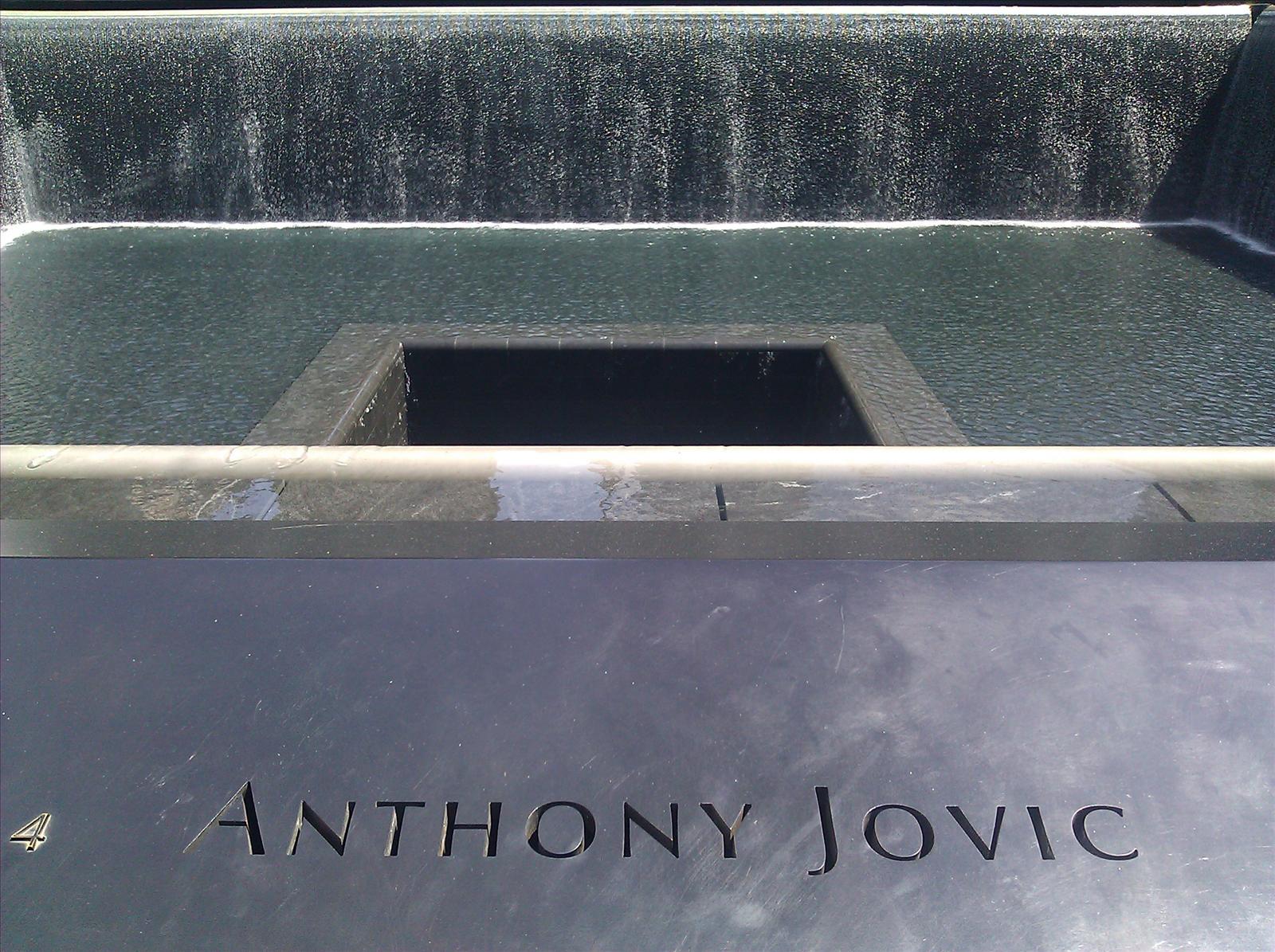
Anthony Jovic's name at Ground Zero (Photo: Richard Chemel)
Lieutenant Anthony Jovic, who considered himself an American Croat, was the son of Croatian immigrants and grew up in the Hell's Kitchen neighborhood of Manhattan, New York. He belonged to Battalion 47, Ladder 34, and was working in Engine 279. This article pays tribute without exception to all the victims, their families, and loved ones, as well as the New York Fire Department. But, in the following lines written by the Bravest Memorial Foundation, we remember Anthony in a special way, who that day had a day off, but did not return home on September 9, 2001, at age 39.
In those first weeks after Lt. Anthony Jovic disappeared with other members of Engine Co. 279 at the World Trade Center, his wife, Cynthia, concentrated on being strong for his two boys, Matthew, 10, and Peter, 9. So she had a little psychological trick she played on herself to keep going. "I'd say, 'He's working today. He's going to come home tonight,'" she recalled. "That night it would be, 'OK, he's working tonight, he's going to come home tomorrow.' Every day I'd tell myself the same thing."
It was because Cynthia Jovic can't imagine morning coffee without her husband of 16 years, a big kidder and hugger-and-kisser who never got through a day without several times telling her and the boys he loved them.
The son of a Croatian longshoreman who grew up in Hell's Kitchen, Jovic, 39, impressed all his friends as being smart enough to win the big one on "Jeopardy!".
The couple met in Manhattan when he was working at a butcher shop on Ninth Avenue and she, also a Croatian immigrant and longshoreman's daughter, was working at a deli nearby. When a cousin suggested they all go to an Irish pub in New Hyde Park, Jovic drove to pick her up in Manhattan in the most formal manner, allowing plenty of time to chat first with her mother and father at the house. For her old-fashioned European parents, his wife said, "it was love at first sight." For the couple, too. They married 2 1/2 years later.
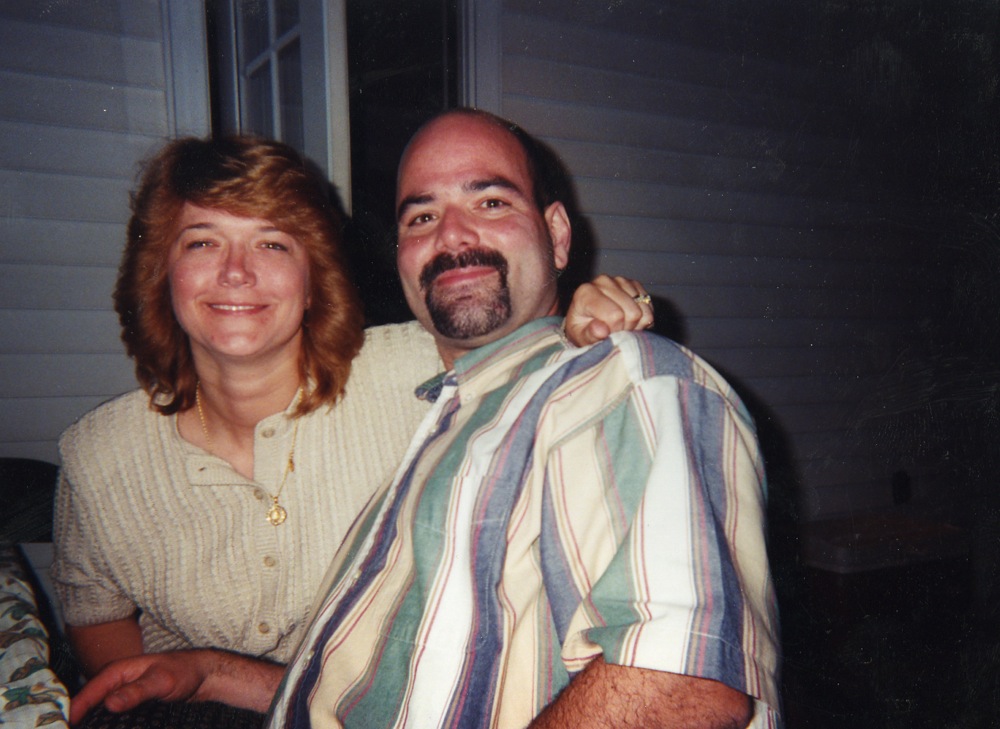
Anthony Jovic with wife Cynthia (Photo: Voices Center for Resilience)
Jovic joined the city fire department 12 years ago, about the time the family moved from Elmhurst to Massapequa Park. He was aiming high, and once he made lieutenant was already spending every free day he could find to prepare for the captain's exam, which he would have taken in October. When not working or studying, it was miniature golf, bowling, and lots of swimming with the family in the backyard pool. They were so close, she could finish his sentences for him.
"We were the happiest when we were together," she said. Cynthia Jovic was watching CNN on Sept. 11; she knew it was bad, because her husband was working with the company in Red Hook, Brooklyn, that day.
"When that [south] tower came down, his soul went right through me. I knew it then, he just went through me and I knew he was gone," she said. His burned and mangled shield turned up in the south tower in November, shortly before a memorial service was held, but no remains have been identified.
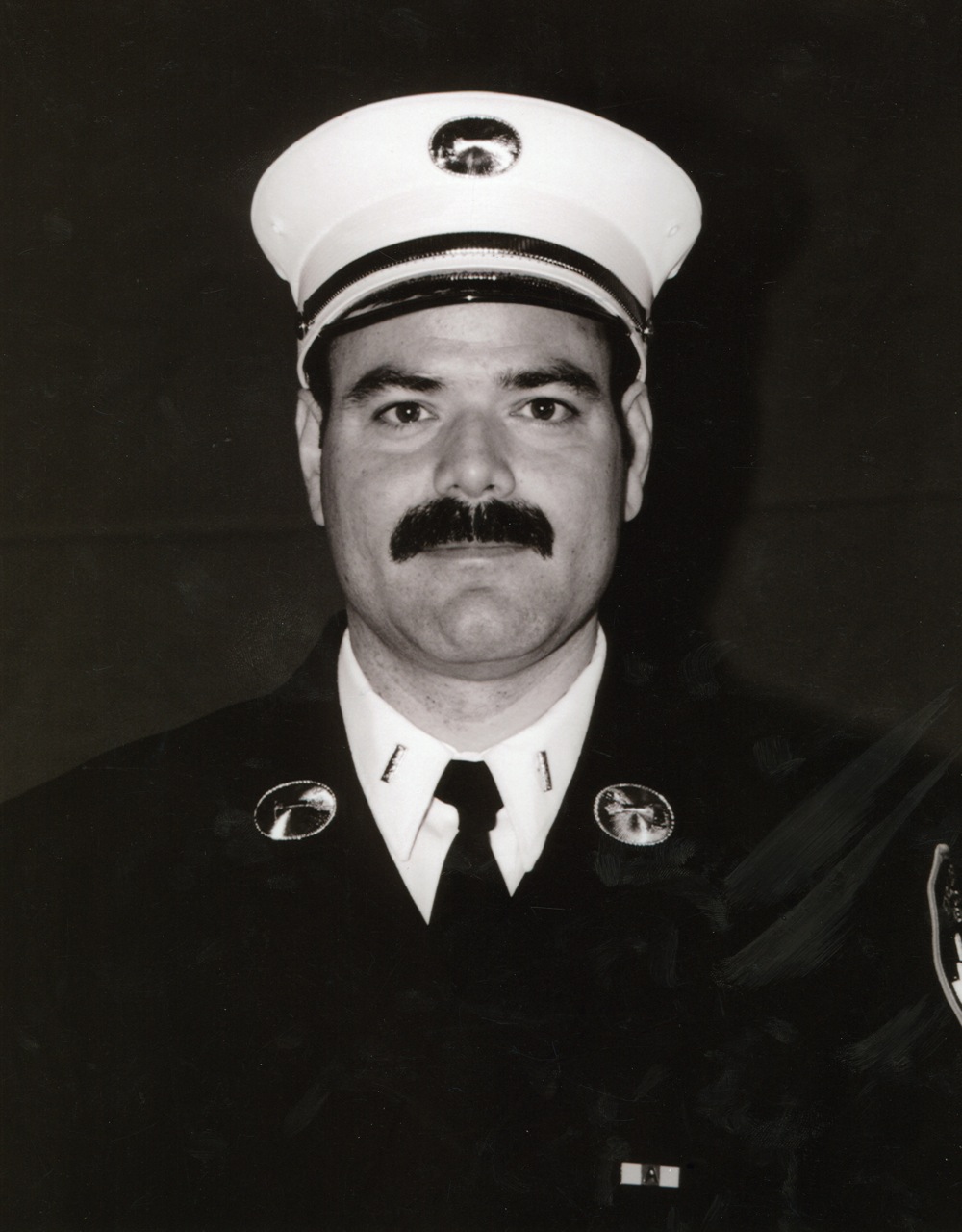
Lieutenant Anthony Jovic (Photo: Voices Center for Resilience)
The memory of that moment has become a source of warmth and comfort lately, now that it's no longer possible for her to pretend her husband is coming home tonight, or tomorrow morning, or the next day. Now, Cynthia Jovic knows, he's with her and the kids all the time. "He always told me, 'Every time they take an ID picture, I try to look nice, because you never know when they might be using it for a memorial.' I'll be honest with you, I think he looks wonderful in the picture that they have of him." (By Elizabeth Moore on Newsday, February 5, 2002)
Two years ago, on September 7, 2019, the New York Post reported that Anthony's eldest son, Matthew, had joined the Fire Department just as his father had, along with other 12 young New Yorkers who followed their parents' steps.
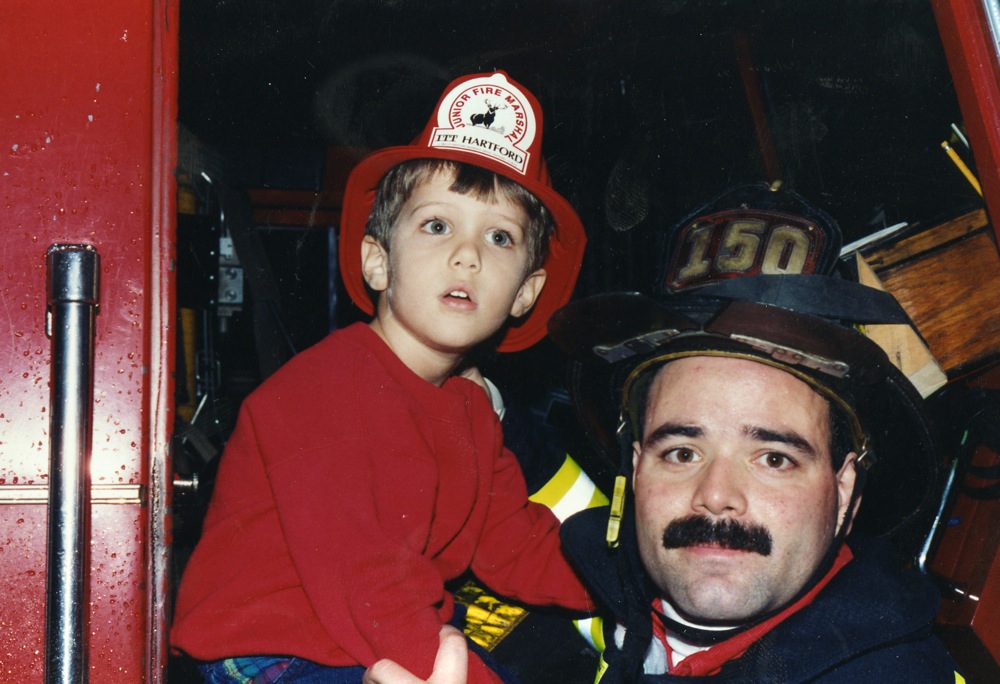
Anthony and his eldest son Matthew, who recently joined the New York Fire Department. (Photo: Voices Center for Resilience)
Our thoughts are with all those who, in one way or another, suffered and continue to suffer from the events that occurred twenty years ago.
For more about the Croatian Diaspora, visit our dedicated page here.
HRK 3.5m Set Aside for Croatian Diaspora Projects For This Year
ZAGREB, 6 Sept 2021 - Croatia has set aside HRK 3.5 million (€467,000) for this year to support projects by Croatian diaspora organizations in 29 overseas and European countries.
Grants will be awarded based on a tender issued by the Central State Office for Croats Abroad. Applications are accepted by 1 October.
Diaspora organizations are invited to submit projects of importance to their development, culture, education, science, sports, and tourism, as well as those that contribute to the preservation of the national identity and promote relations between the diaspora and Croatia.
One organization can submit not more than two projects or programs, and grants range between HRK 5,000 (€667) and 80,000 (€1,067) per project.
For more about the Croatian Diaspora, visit our dedicated page here.
Croatian Language Scholarship: Ten Things You Need to Know Before Arriving
September 6, 2021 - With the final list of the Croatian language scholarship recipients already published, many are packing their bags and others are already exploring Croatia before starting their classes. However, some still wonder about many things related to the course. What should they know before arriving?
On May 14th of this year, the Central State Office for Croats outside the Republic of Croatia announced the call to apply for the scholarship to study the Croatian language in four cities: Zagreb, Split, Rijeka, and Osijek. Applications were closed on June 14th, and the first list of scholarship recipients was published at the end of July. Later, after seven days of appeals by those who did not appear on the first list and others who desisted, a second and final list was published on August 17th.
Although the exact dates for the start of classes are not yet confirmed, it is expected to take place in the first week of October. We wish it were as simple as going from the airport to your desk and starting your Croatian language classes, but there are many things you should take into account before and when you arrive in Croatia (if you are traveling for the first time). Before we begin with the list, it is important to add at this point that there are three contacts with whom you will communicate before, during, and even after your participation in the course, and all three are in charge of different aspects of the scholarship. One is the Central State Office for Croats outside the Republic of Croatia, which is a government body that finances and organizes scholarships to study the Croatian language in the Republic of Croatia. The second is the Croatian language studies department at the Faculty of Philosophy of the city to which you have applied. Finally, you will also communicate with the accommodation in which you will stay during your studies.
Without further a due, here are ten things to keep in mind:
1. Confirm your participation in the course
After seeing your name once the first list was published in July, you probably took your participation in the course for granted. Although it is true that being on the list means having obtained a place to study the Croatian language in Croatia and access certain benefits, it is necessary to confirm your participation, as sometimes it happens that some do not show up or withdraw from their participation. So that the Office in charge can properly prepare the logistics behind the course, make sure to check your mail (both in your inbox and in the spam box). You will find an email asking you to confirm your participation in the course, as well as other instructions.
Weeks prior to your arrival you will receive emails with information about your classes, such as your schedule or classroom. In some cases, you will be asked to take a pre-test online to determine your current level of Croatian. Don't worry, it's just to get an idea.
Note: if you have not received a confirmation email, be sure to write to This email address is being protected from spambots. You need JavaScript enabled to view it. and confirm your participation, as well as ask for additional information about the scholarship.
2. Confirm your accommodation
As well as confirming your participation in the Croatian language course scholarship, you will also need to confirm your accommodation, if you qualify for it. The Croatian language scholarship includes a stay in student accommodation in your city, but places are limited. A number of accommodation places have been assigned by each city. For example, 50 places were assigned for accommodation in Zagreb, and to find out if one corresponds to you, you must check your order in the final list of the Croatian language scholarship recipients. If you are in the top 50 on the list for Zagreb, you will most likely have an accommodation quota. Why do I say "most likely"? Because it must be taken into account that:
a) The accommodation right is only given to those younger than 36.
b) Not everyone asked for accommodation on their applications.
That is why we recommend you check your email for any communication from the student accommodation office of your city, in which they will inform you that you are part of the list of those to stay in student accommodation. If not, write an email to the Central Office as in the previous point, since they are the ones who determine the list of students to stay in the student accommodation.
Note: if you have received an email from the student accommodation office, in addition to requesting a confirmation, they will also ask you in advance to indicate the date you plan to check in. Likewise, some student accommodation may request a medical certificate, the format of which will be attached in the mail, and which must be filled out by your doctor or pediatrician. Do not forget to fill it out and bring it printed to do your check-in.
3. Bring all your documentation
During the months prior to the start of the Croatian language course, you have surely gathered a large number of documents and papers that served you for your application. Well, although it is very likely that you will not need them again, we do strongly recommend that you organize a folder in which you archive all the documents related to Croatia. Not only can an unexpected or unforeseen situation arise, but you will also need them if you decide to apply for one more semester of the Croatian language course while in Croatia if you previously only applied to one.
We recommend you have a digital folder, and another with all your printed documents. Some of the things you can bring are:
- Original and copy of your passport (of your country of birth and Croatian, in case you have the latter).
- Original and copy of your ID (from your country of birth and Croatian, in case you have the latter).
- Driver's license (you can use the one from your country for a year, then you will have to change for a Croatian one at the Police Station).
- Criminal records (apostilled).
- Medical history (translated, preferably).
- Information and details of your international health or travel insurance.
- ID size photos (useful to get your public transport card and other procedures).
Any other documents that you consider convenient to bring, especially those that must be apostilled, we recommend that you include them since it will be difficult to get them later once you are in Croatia.
Every year, many students take advantage of their stay in Croatia to obtain their nationality and/or citizenship (passport). If this is your case, take into account the necessary documents to apply to each one, and be sure to include them in your folder. We recommend you bring:
- Croatian nationality papers (yours, if you have them).
- Croatian nationality papers from your closest Croatian relative (father, grandfather, great-grandfather, great-great-grandfather, etc).
- Your original birth certificate (apostilled, translated, current and notarized if he is a foreigner).
- The original birth certificate of your closest Croatian relative (father, grandfather, great-grandfather, great-grandfather, etc).
- Your passport (original and copy).
- Your ID (original and copy).
- A valid identity document with a visible photo (and an apostilled, translated, and notarized copy).
- Criminal record certificate (no more than 6 months old, apostilled, translated, and notarized).
- Your biography (translated into Croatian and including the reasons for your application).
Note: depending on your case, they may request all these documents, only some or other additional ones. For more information on applying for Croatian nationality and citizenship, check out this guide made by Sara Dyson, from Expat in Croatia, approved by an immigration lawyer and the ministry that approves nationality and citizenship. You can also check the information given by the Ministry of Interior (MUP) in Croatia HERE.
4. Check-in at your accommodation
The first thing you will want to do when you arrive in Croatia if you have confirmed your stay in the student accommodation is to check in and settle in. After the whole trip, and with so many suitcases on top, it is best to rest and organize yourself before moving on to the next thing. For this, it is necessary to have agreed to your arrival date by email with the office of your student accommodation. It may be that in some cases they tell you that it can be done only with some anticipation, both in days and in hours. For example, if your plane arrives on a Sunday afternoon, you may need to spend the night elsewhere and check in first thing in the morning on Monday. In case you haven't booked your flight yet, the wisest thing would be to fly a few days earlier.
Next, we indicate the address and location of the student accommodation in each city. If you have everything agreed with the office, go to the reception of your accommodation to present your documentation, for checking in, and receiving your room key and accommodation contract.
Zagreb
- Studentski Dom Ante Starčević
Zagrebačka avenija 2, 10000 Zagreb
email: This email address is being protected from spambots. You need JavaScript enabled to view it.
Box office: 01 4590 841, Management: 01 4590 843
Manager: Damir Mikulić, tel. 01 4590 842
Reception / port of the student settlement: 01 4590 840; 091 4593 539
(working hours: 0 - 24h)
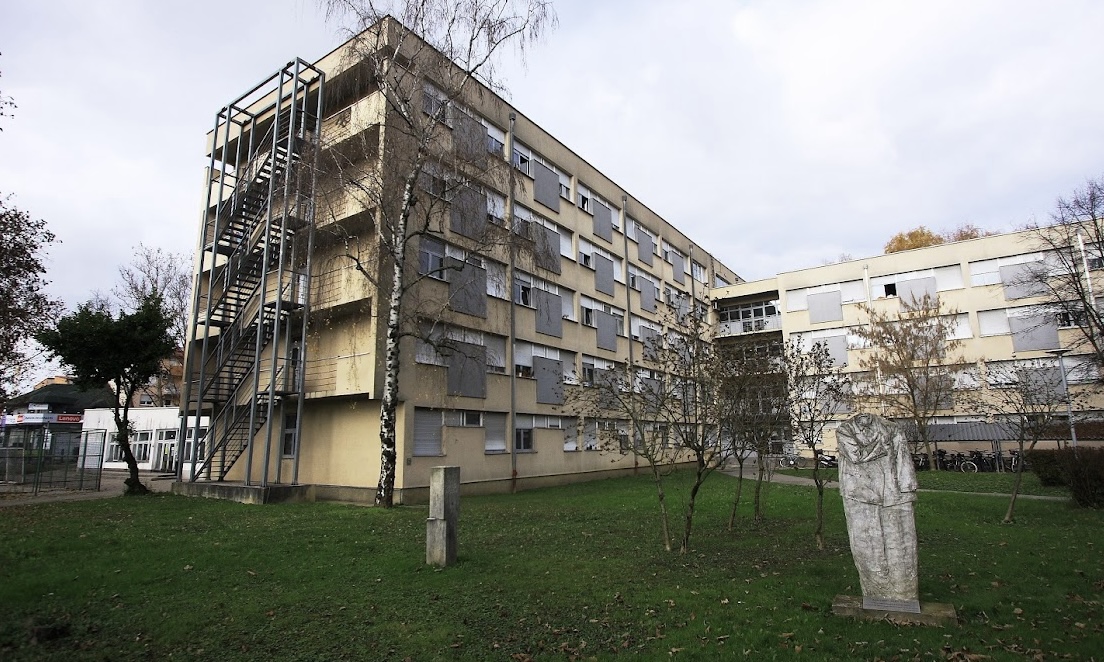
Student Accommodation Ante Starčević (Photo: Pavle Miljovski)
- Studentski Dom Stjepan Radić
Jarunska 2, 10000 Zagreb
e-mail: This email address is being protected from spambots. You need JavaScript enabled to view it.
Tel. administration: 01 45 90 801, cashier: 01 45 90 811, fax: 01 30 15 946
Manager: Boženko Ćosić, tel. 01 45 90 802
Reception / port of the student settlement: 01 4590 800; 091 4593 536
(working hours: 0 - 24h)
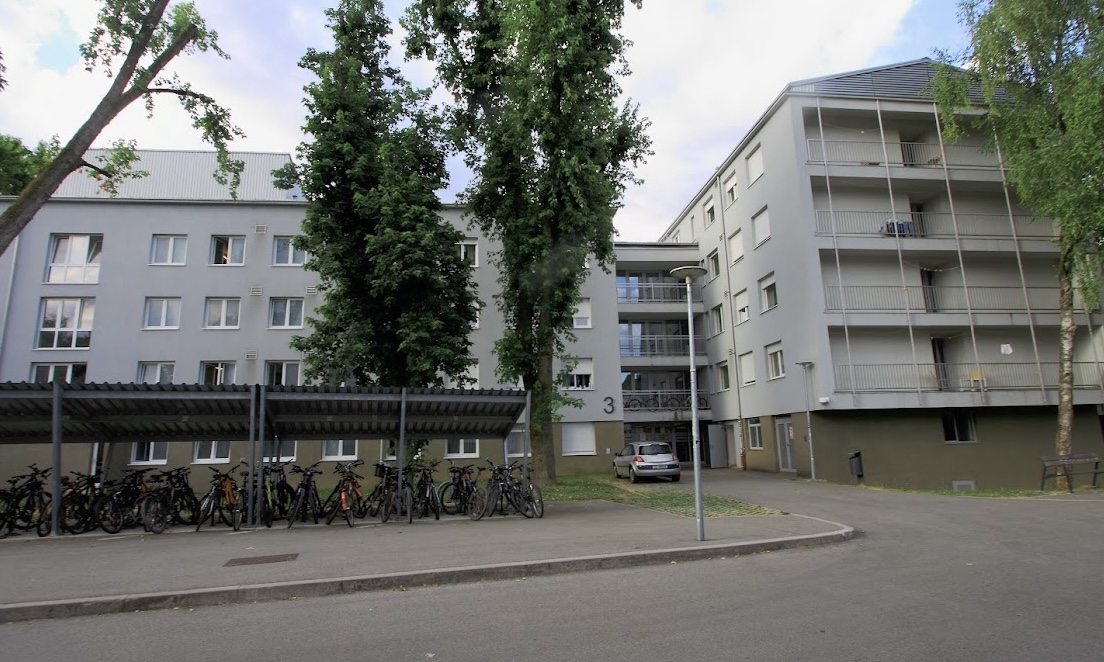
Student Accommodation Stjepan Radić (Photo: Pavle Miljovski)
Split
- Dom Kampus Dr. Franjo Tuđman
Cvite Fiskovica 3, 21000 Split
Tel: 021 / 440 - 999, fax: 021/440-958
e-mail: This email address is being protected from spambots. You need JavaScript enabled to view it. (accommodation hostess)
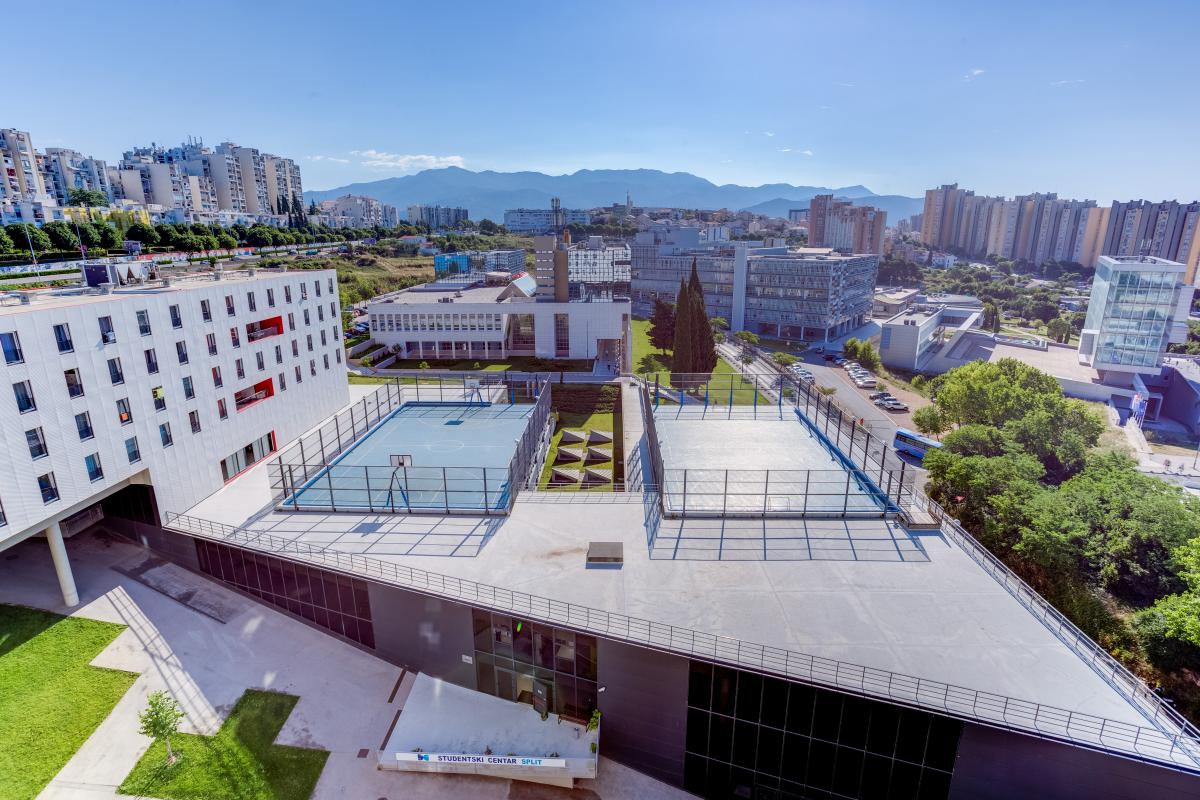
Student Accommodation Franjo Tuđman (Photo: Split Student Center)
- Studentski dom "Bruno Bušić"
Spinutska 37, 21000 Split
Tel. 021 / 510 - 850
e-mail: This email address is being protected from spambots. You need JavaScript enabled to view it.
e-mail: This email address is being protected from spambots. You need JavaScript enabled to view it.
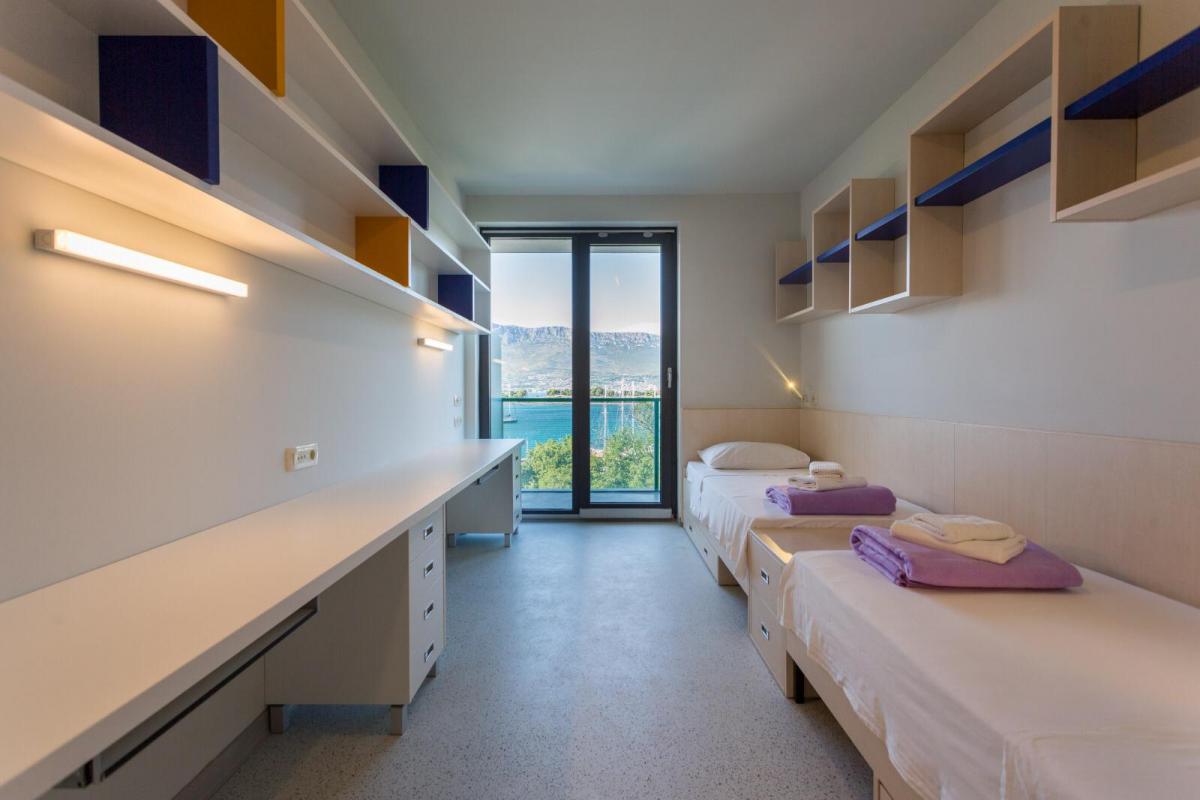
Student Accommodation Bruno Bušić (Photo: Split Student Center)
- Studenski dom Hostel Spinut
Spinutska 39, 21000 Split
Tel: 021/386-711, 021/386-733, fax: 021/386-774
e-mail: This email address is being protected from spambots. You need JavaScript enabled to view it. (receptionist)
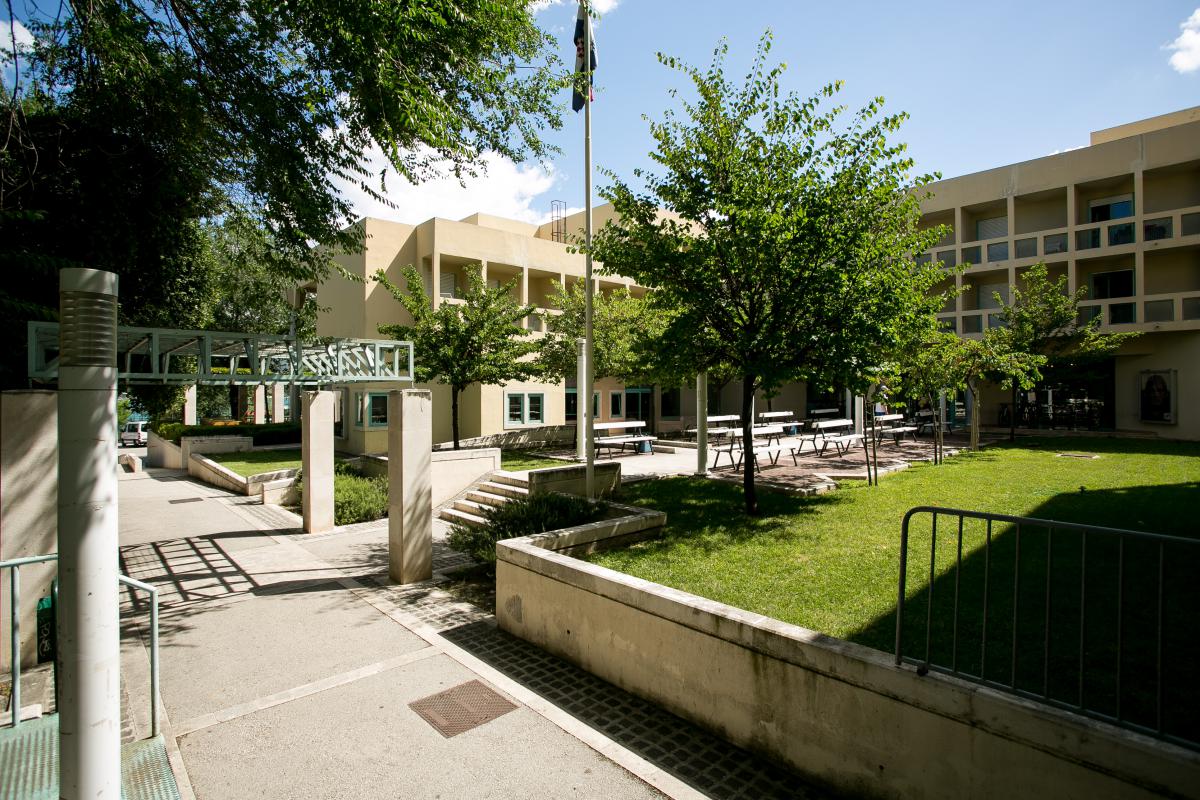
Student Accommodation Hostel Spinut (Photo: Split Student Center)
Rijeka
- Studensko Naselje ''Trsat''
Ul. Radmile Matejčić 5, 51000, Rijeka
e-mail: This email address is being protected from spambots. You need JavaScript enabled to view it. / Student Center: This email address is being protected from spambots. You need JavaScript enabled to view it.
Tel. +385 51 584 530
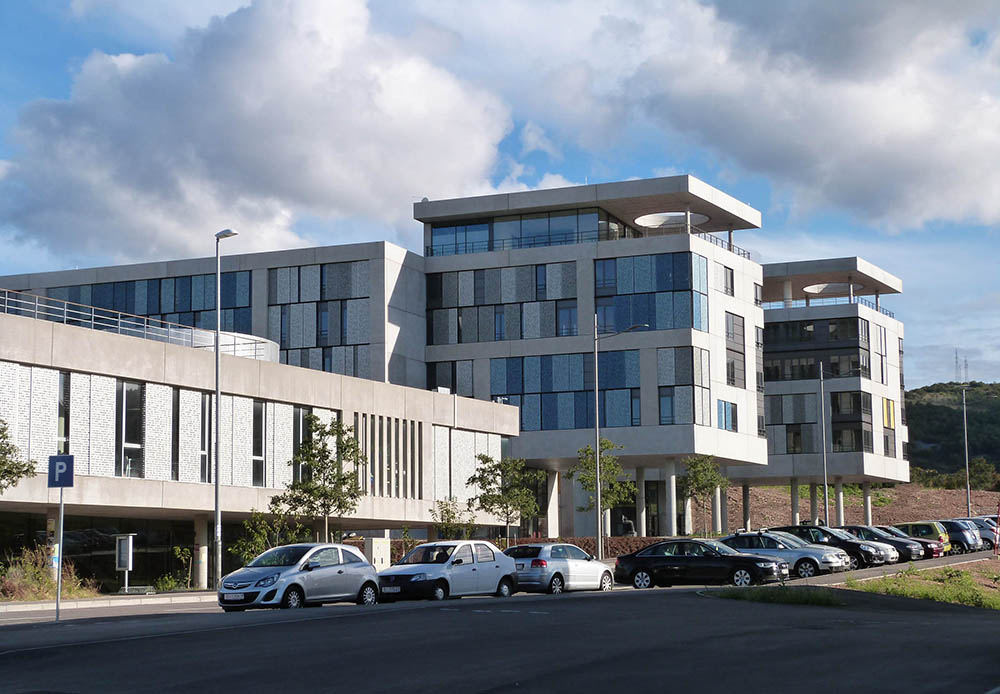
Student Accommodation Trsat (Photo: Rijeka Student Center)
Osijek
- Studentski Dom IGK
Ivana Gorana Kovačića 4, Osijek 31000
Phone: Management - (031) 574 002
Reception - (031) 574 269
Working hours of the administration: from 7-15 hours
work with clients 08-14 hours
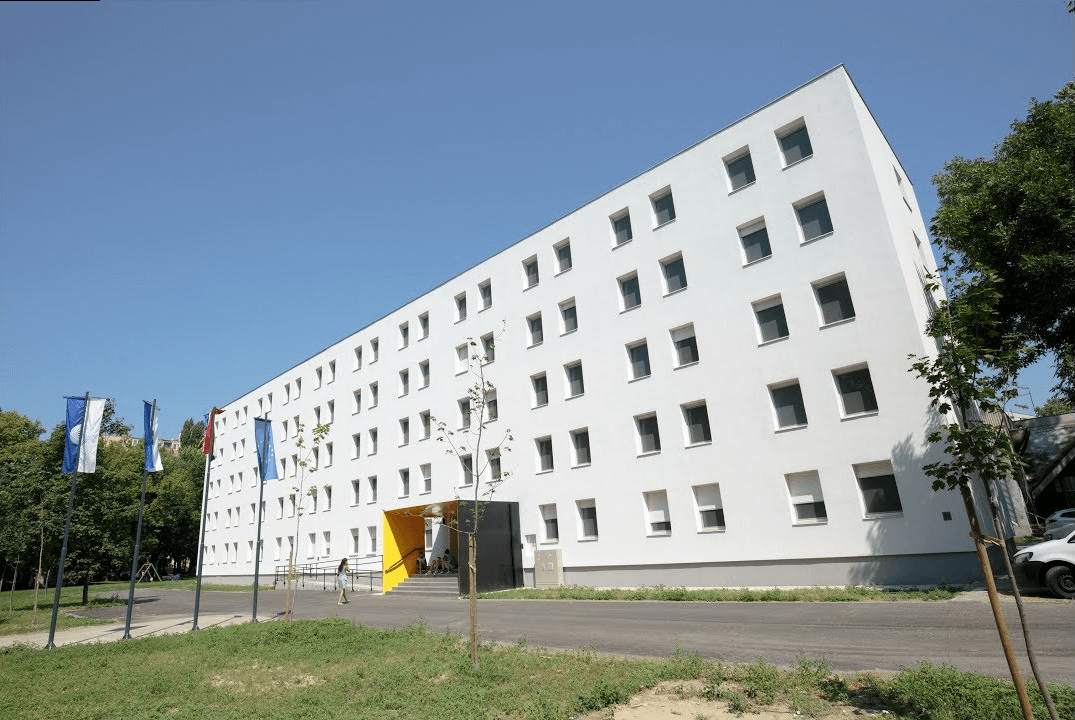
Student Accommodation IGK (Photo: Osijek Student Center)
- Studentski Dom K.P. Svačića
Kralja Petra Svačića 1C, Osijek 31000
Phone: Management - (031) 251 121
Reception - (031) 251 120
Working hours of the administration: from 7-15 hours
work with clients 08-14 hours
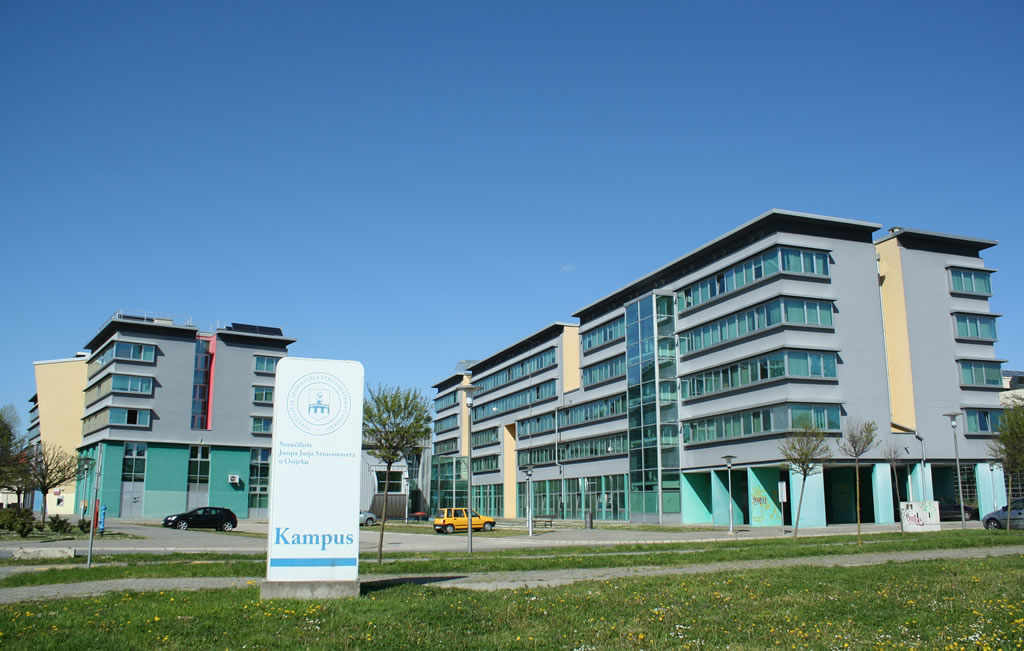
Student Accommodation K. P. Svačića (Photo: Osijek Student Center)
Do not forget to bring your medical certificate in case they have previously requested it by mail. You must also present your passport to be identified. You will be asked to fill out a form related to COVID-19 and sign a contract. Once registered, they will give you your keys and indicate your pavilion and bedroom. In some accommodations, such as in Rijeka, they will give you directions for the use of other facilities such as the laundry, gym, and library.
Note: Remember that student accommodation in Croatia CANNOT be used for self-isolation. It is also prohibited to consume alcohol or drugs inside the accommodation. Doing so may mean your expulsion from the scholarship and not being able to apply again in the future. Remember, when you come to Croatia you are a representative of your country.
5. Formally enroll in the course at the Faculty of Philosophy
Once you have checked into your accommodation and taken a good rest, go to the Faculty of Philosophy in your city, to officially enroll in the Croatian language course. In each Faculty, there is the department in charge of organizing the Croatian language course in that city, and they will provide you with the necessary information about the course, as well as some documents that will be useful to you. We recommend that you attend the Faculty early to enroll since in many cases they only work until 1:00 p.m. or 2:00 p.m.
You will have to ask them about the public transport card, and they will give you a student document and instructions to acquiring it at the public transport office in your city. Also, ask them about the WiFi, and they will give you your username and password that can be used both in the building of your Faculty, as well as in your accommodation and in various parts of the city.
Remember when I mentioned above that you organize all your documents in one folder? It would be a good idea for you to take it to the Faculty at the time of enrollment, they will surely ask for an ID and probably passport-size photos.
The Croatian language course is organized at the Faculty of Philosophy in Zagreb, Split, Rijeka and Osijek, and is conducted by the Center for Croatian as a Second and Foreign Language "Croaticum" (Zagreb), the Center for Croatian Studies in the World (Split), Rijeka Croatian School (Rijeka) and the Department of Croatian Language and Literature (Osijek).
Depending on your city, this is where you should head to:
- Zagreb: Ul. Ivana Lučića 3, 10000, Zagreb / http://www.ffzg.unizg.hr/centar / +38514092111 (On Google Maps)
- Split: Poljička cesta 35, 21000, Split / http://www.ffst.unist.hr/ / +38521386122 (On Google Maps)
- Rijeka: Sveučilišna Av 4, 51000, Rijeka / http://www.ffri.uniri.hr/ / +38551265600 (On Google Maps)
- Osijek: Ul. Lorenza Jagera 9, 31000, Osijek / https://www.ffos.unios.hr/ / +38531211400 (On Google Maps)
Note: the Croatian language scholarship includes the two subsidized meals, and for this, you will need a card that will be provided by the Central Office of the State for Croats outside the Republic of Croatia, through the Croatian language department in your Faculty. Unfortunately, it is unlikely that you will receive it on the first day or even in the first few weeks, so you will need to be patient. Eventually, it will be your teacher who will give you your card.
6. Register your address at the police station
Something essential and that depends largely on you, is to register your residence in Croatia. Although there are students with a Croatian passport, this is not an exception to do so, because in Croatia it is mandatory to have a registered residence and address, and this information does not appear in the passport. Likewise, those who do not have a passport should even more so register their residence since the duration of the course exceeds 90 days of free transit through the country as a non-EU citizen.
The Central State Office for Croats outside the Republic of Croatia, through your Croatian language department in your Faculty, will provide you with a study contract for the scholarship that you will need to bring to the police station in your city. In addition, you must bring your original passport and the accommodation contract that you were given when you check-in at your student accommodation (or in case you have stated elsewhere, a valid accommodation document or contract).
Like the meal card, the study contract can take a few weeks to be delivered, so you must be patient and, as soon as you receive it, go to the police station.
The police stations in each city are as follows:
- Zagreb: Ul. grada Vukovara 33, 10000, Zagreb (On Google Maps)
- Split: Trg Hrvatske bratske zajednice 8, 21000, Split (On Google Maps)
- Rijeka: Ul. Žrtava fašizma 3, 51000, Rijeka (On Google Maps)
- Osijek: Trg Lavoslava Ružičke 1, 31000, Osijek (On Google Maps)
For those interested in applying for their citizenship or passport, this is a vital step to achieve it, since these procedures (especially that of citizenship) can take several months, even longer than a semester of studies lasts. In addition, if you do not have a permanent or temporary residence in Croatia, the Ministry will simply reject your application. Therefore, those without a Croatian passport will have to apply for a one-year temporary residence in Croatia and to achieve this you will need to present the aforementioned documents at the police station, including the study and accommodation contract. Remember then that before applying for citizenship, you must first apply for temporary residence. Unfortunately, both cannot occur in parallel, and you must first receive the resolution of your approved temporary residence before applying for citizenship.
Note: it is highly recommended to organize yourself and be clear about where you will spend the year in which you process your citizenship. For example, if you really believe that you will spend a year in Zagreb studying the Croatian language, apply for temporary residence and your citizenship in that city. Another example is of someone who applies for a first semester to Split, and at that time they apply for temporary residence. Then, they decide to apply for a second semester in Osijek, while they wait for the resolution of their temporary residence. This is not recommended as the police consider your address to be in Split, not Osijek. This could affect obtaining your temporary residence or your citizenship.
7. Open a bank account
While opening a bank account is important in any circumstance, as a scholarship student you have an additional reason to consider it. If you stay in student accommodation, you will have to pay the cost of accommodation on a monthly basis (the amount depends on the accommodation). You should go to your accommodation office at the beginning of the month and make the payment.
"But didn't the Croatian language scholarship include free accommodation?" Yes! Compensation for accommodation will be paid to you after you submit the following documents:
- certificate from the Faculty of Philosophy on successfully completed course,
- a Žiro account agreement (not a current account), in your name, concluded with any commercial bank in the Republic of Croatia, with the indicated giro account number (IBAN),
- certificate (certificate) of the Ministry of the Interior of the Republic of Croatia (MUP) on your residence/stay in the Republic of Croatia, with the stated address of the student settlement.
- One of the attached documents should also show your personal identification number (OIB).
Once you obtain your accommodation contract, which will be given to you the day you check in at your student accommodation, take that contract along with your passport to the bank of your choice, and in addition to a current debit account, you must also request a Žiro account (pronounced: SHI-ro). At the end of the course, you must send the IBAN (account number) of your Žiro account to the Central State Office, to receive compensation for your accommodation.
Note: to open an account in a Croatian bank it is not necessary to have permanent residence in the country or Croatian citizenship. All you need is an OIB (Osobna Iskaznica Broj) identification number. If you have a Croatian passport or ID, you will find this number in either of the two. If you don't have an OIB number, you will need to get one. To find out how to obtain an OIB number, check out this Expat in Croatia guide, which includes the form to fill out and all the necessary steps. Remember that you will also need your OIB to request accommodation compensation at the end of the course.
8. Buy your study materials
To study the Croatian language you will need a learning book and an exercise book. Don't worry if you still don't have your books to study the Croatian language as soon as you arrive. Usually, your teacher will provide you with copies in the first few days, and it is he or she who you can ask where to get them. Remember that you will not be given copies for the entire semester! Most likely, your faculty has its own bookstore, where you can buy your books to study Croatian.
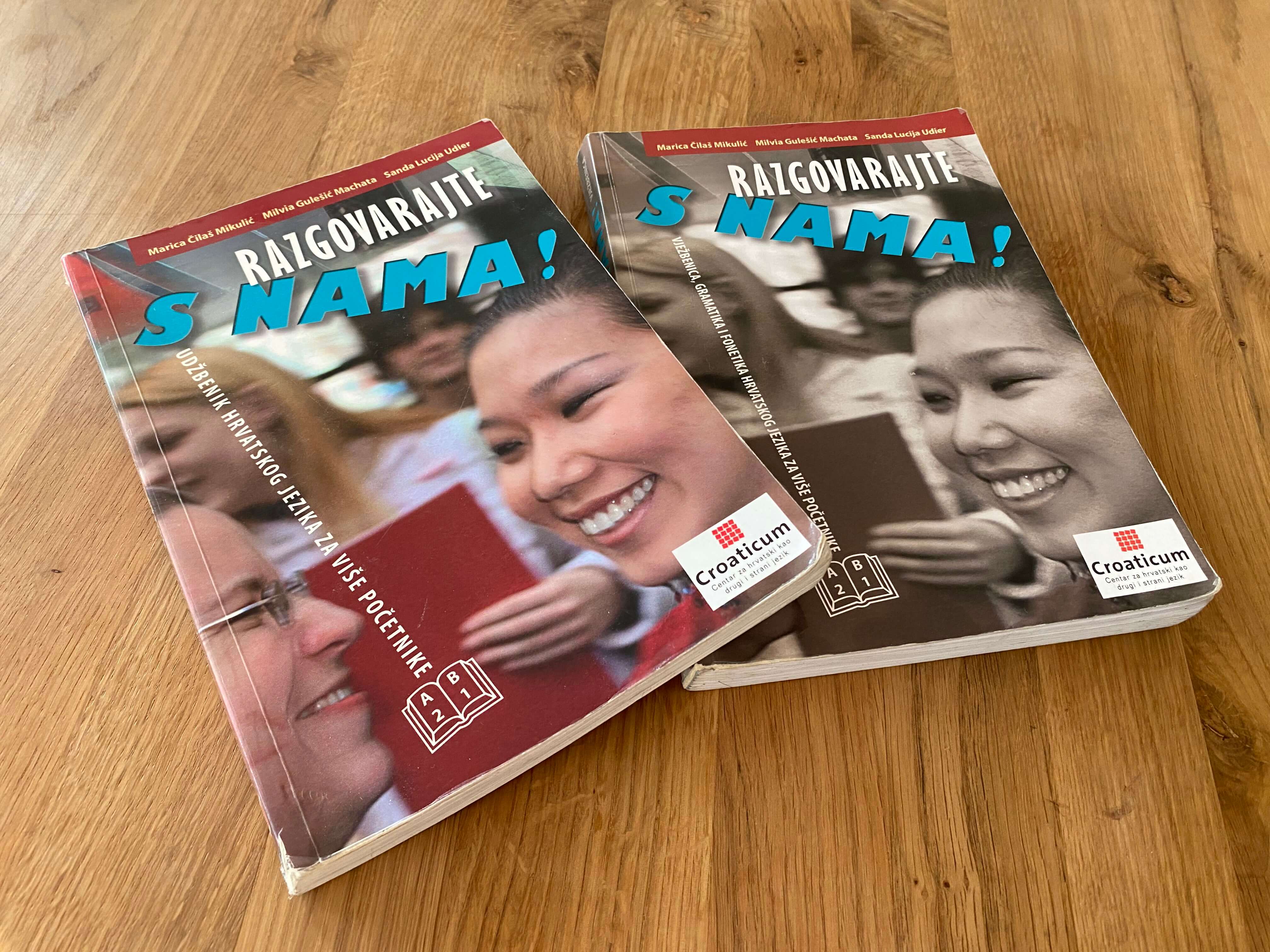
The learning book on the left, and the exercise book on the right. These books are for the A2/B1 level. (Photo: Jose Alfonso Cussianovich)
Take good care of your books, as they can be useful even after studying the course. The learning book includes a Croatian to English dictionary on the final pages, and the exercise book includes tables of contents at the end for easy review of rules for declensions, conjugations, and more.
Note: make sure that the books you buy correspond to your learning level. If this is your first time studying the Croatian language, you will most likely need to buy the A1 / A2 level books.
9. Respects health measures against COVID-19 in your accommodation and faculty
Despite the difficulties and obstacles due to the COVID-19 pandemic, the Central State Office for Croats outside the Republic of Croatia managed to develop the scholarship for the Croatian language course in the March-June 2020 semester, the semester from October 2020 to January 2021, and the semester from March-June 2021.
The only possible way to develop the Croatian course was through online learning, thus respecting the measures and restrictions imposed by the Croatian government. As the epidemiological situation began to improve over time, some faculties such as Zagreb and Split returned to face-to-face classes for the March-June semester of 2021. It should be noted that in order to develop face-to-face classes normally, the use of masks, as well as the reduction of the number of students per class, and distribution of seats in the classroom that respects social distancing.
It is expected that this year all the faculties will return to face-to-face teaching, but that means respecting, in the same way, the epidemiological measures to combat the pandemic. Masks are mandatory. Through the call made by the Central State Office in May, a special call was made to the selected students to reconsider the possibility of traveling to Croatia and that, as an alternative, they could still take the language course online from their countries.
During the study time of the course, it is recommended to avoid attending classes in case you feel fever, malaise, or cold. Notify your teacher and classmates by mail if you suspect you may have COVID-19. Take a PCR test to rule out that you have COVID-19. If it is negative, communicate with your teacher and classmates so that they are calm. If it is positive, contact the health center and your accommodation, and follow their instructions to be transferred to other facilities where you can perform isolation during your recovery. Remember, student housing cannot be used, under any circumstances, as a place for self-isolation.
In case you feel ill or feel obliged to miss class, let your teacher know in advance and you will see that it is possible to attend class online from your room.
IMPORTANT: If you have already been vaccinated, it is important that you provide this information to your accommodation when registering upon arrival. We also recommend you go to the HZZO (Croatian Health Institute) and ask for the COVID Passport, which is a QR code that will begin to be requested on a mandatory basis throughout the country to attend different events or places.
Note: If you have not yet been vaccinated and want to do so, contact the Central Office of the State, and it is very likely that they will help you get a vaccination appointment in your city.
Note: Do not forget to wear a mask in the corridors of your accommodation and faculty.
For all you need to know about coronavirus specific to Croatia, including travel, border, and quarantine rules, as well as the locations of vaccination points and testing centers across the country, make sure to bookmark our dedicated COVID-19 section and select your preferred language.
10. Get everything ready for your trip to Croatia!
Weather in Croatia
Now that you know everything you need to know before traveling to Croatia and attending your Croatian language classes, get ready for the months to come! You will surely attend the semester from October 2021 to January 2022, for which I will tell you what is the climate that awaits you in the Croatian autumn and winter.
If you attend classes in Split or Rijeka, you will find yourself in the second and third largest cities, respectively, in Croatia, and both are located on the Adriatic. In October you will find warm and sunny days where the temperature can reach up to 20 degrees, as well as cold but not icy nights, with temperatures that drop to 14 degrees. It is possible to take a dip in the sea during this month! However, it is likely that at this time of year (especially in these two cities) you will find rains, winds, and storms that begin to appear more frequently. In Zagreb, located in central Croatia, and Osijek to the east, the weather may be similar, but surely less sunny.
Starting in November you will notice that the temperatures will begin to decrease progressively (17 degrees max, 10 degrees min), and the sunny days will become less frequent. You will get used to the strong winds and rain. Already in December and January, you will start to wrap yourself more warmly against the cold temperatures both during the day and at night (5 degrees max, and temperatures can drop to -5 or -7 degrees. If you are in Zagreb or Osijek, prepare for the snow!
Therefore, we consider it essential that you bring:
A jacket to keep you warm in very low temperatures
Cotton or wool sweaters
A windbreaker that can also keep you warm
A waterproof jacket for the rain
Leg warmers
Warm socks
Winter pajamas
Waterproof boots (you can ruin your white sneakers in puddles caused by rain)
Winter gloves
Hats for the cold
Umbrella (very important!)
Sunglasses (despite the low temperatures, there can still be very sunny days and the sunlight bouncing off the marbles of Diocletian's Palace in Split could leave you blind!)
In the winter months, the student accommodation turns on the heat in the student rooms. We recommend that you check this at the offices of your accommodation since in some cases it is necessary to confirm that you expressly wish to do so.
If you applied for two semesters or plan to apply for a second one while attending the first one, then you'll expect hotter months from May to June. But don't worry, you'll have enough time to buy some shorts, swim trunks, or sandals. My suggestion? Travel light! Clothes prices in Croatia are great, so you can travel with what you really need and search for whatever you might need later here.
To learn more about the weather in Croatia, visit the complete Total Croatia guide.
In case you find yourself caught in a rain or storm in Croatia, read this interesting page from Total Croatia on what to do while it rains in Croatia.
Currency in Croatia
Regarding the currency, remember that in Croatia the Euro is not used, but rather the Kuna. In addition, it is very likely that in several places they will ask you to use cash and not a card. If you arrive at the airport, we recommend that you change only a little of your money there to move to the city. It is preferable that you exchange your euros or dollars at an exchange office in the city, where the prices are better.
To give you an idea, one euro is equivalent to 7 kunas. While a dollar is equivalent to 6 kunas.
The expenses during your stay may vary depending on the city, but with some approximate ones, you could calculate what you will need monthly:
- 100 kunas per month to cover public transport
- 105 kuna per month to cover your meal (using the card for the two subsidized meals)
- 120 kuna per month for laundry (once a week, 30 kuna)
- 540 kunas per month to pay for accommodation (in Zagreb the amount is 300 kuna, but we have put the most expensive in Rijeka as a reference)
- 150 kuna per month to pay for an unlimited data plan on your phone with Telemach
- 2000 kuna for extra expenses (food, clothing, movie tickets, taxis, travel, etc)
In total, you may need approximately 3815 kuna or 450 euros to cover some monthly expenses.
For more information about currency in Croatia, visit Total Croatia 's complete guide.
Transport in Croatia
Depending on your city, you will notice that public transport is different. If you are lucky, it is likely that you will quickly become familiar with the routes and bus stops in your city, but most likely at first you will miss a stop or get lost. Don't worry, the four cities have very well organized transport systems and, if you make a mistake, you will see that you will be able to orient yourself again.
In Zagreb, the city has a transportation system that includes tram and bus routes. You can get to any part of the Croatian capital in both. You should make sure you have a balance on your public transport card, and remember that at the beginning of the month you will have to recharge it at a Tisak or at the Zagreb Public Transport (ZET) office, as it cannot be accumulated between different months. Another alternative is to buy 4 kuna tickets in a Tisak, which you can use to make two trips within 30 minutes on both the tram and the bus. You can also buy the ticket from the driver, but this will cost you 6 kuna.
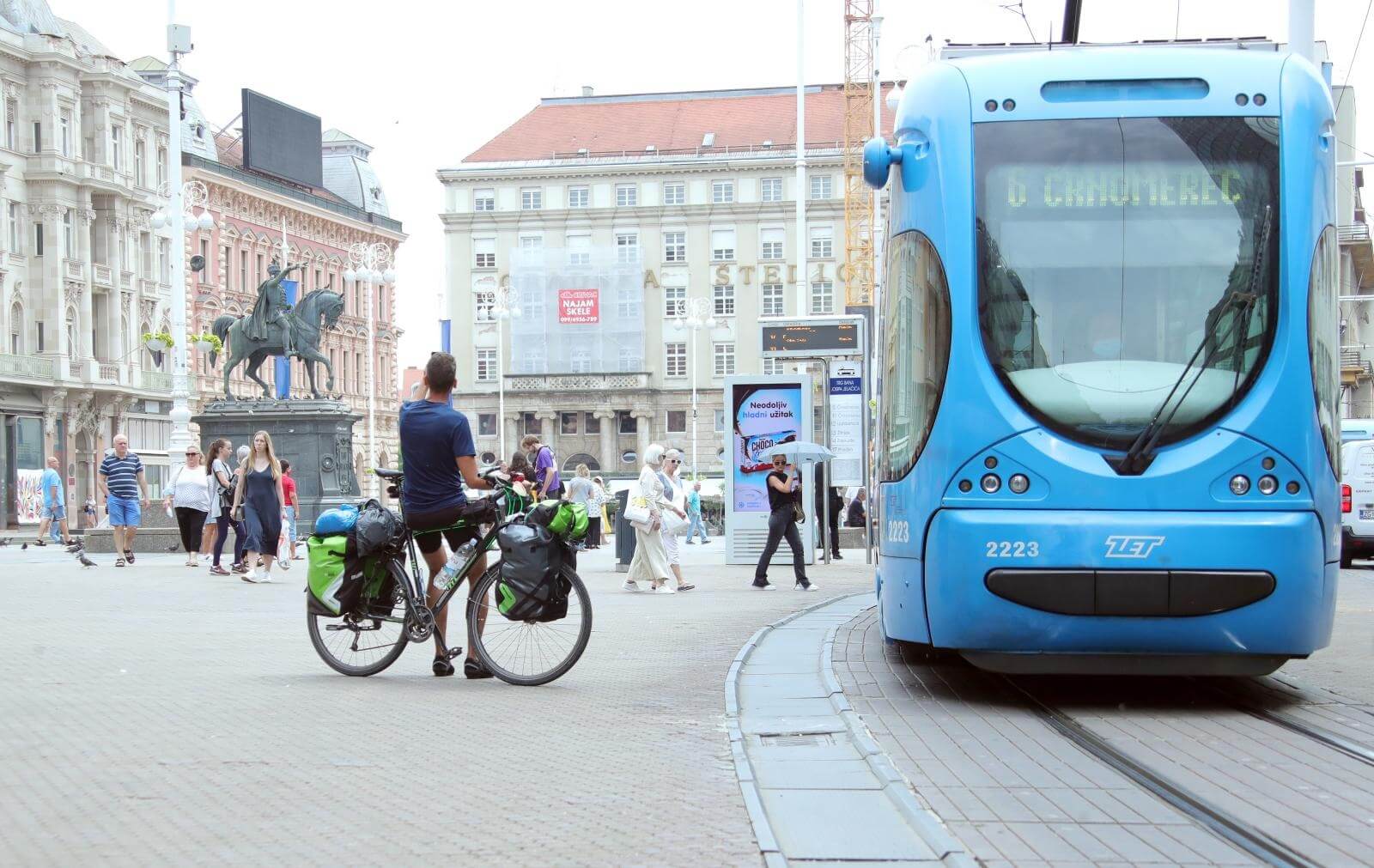
The Zagreb trams at the Ban Josip Jelačić square (Photo: Sanjin Strukic/PIXSELL)
In Rijeka, the city has a bus system called Autotrolej that connects the city. As in Zagreb, you will need to get your public transport card to move from Trsat (where your accommodation and classes are) to the center and vice versa. In this city, it is highly recommended to have the card, since the largest number of shops and restaurants are in the center, and to return to Trsat you have to walk a lot and through steep streets, which in these times can become streams of water with storms and rains. The buses that take you to and from Trsat are lines 2, 7a, and 8. If you want to buy the ticket from a Tisak or from the driver, it will cost you 10 kuna if you travel from Trsat to the center of Rijeka and vice versa.
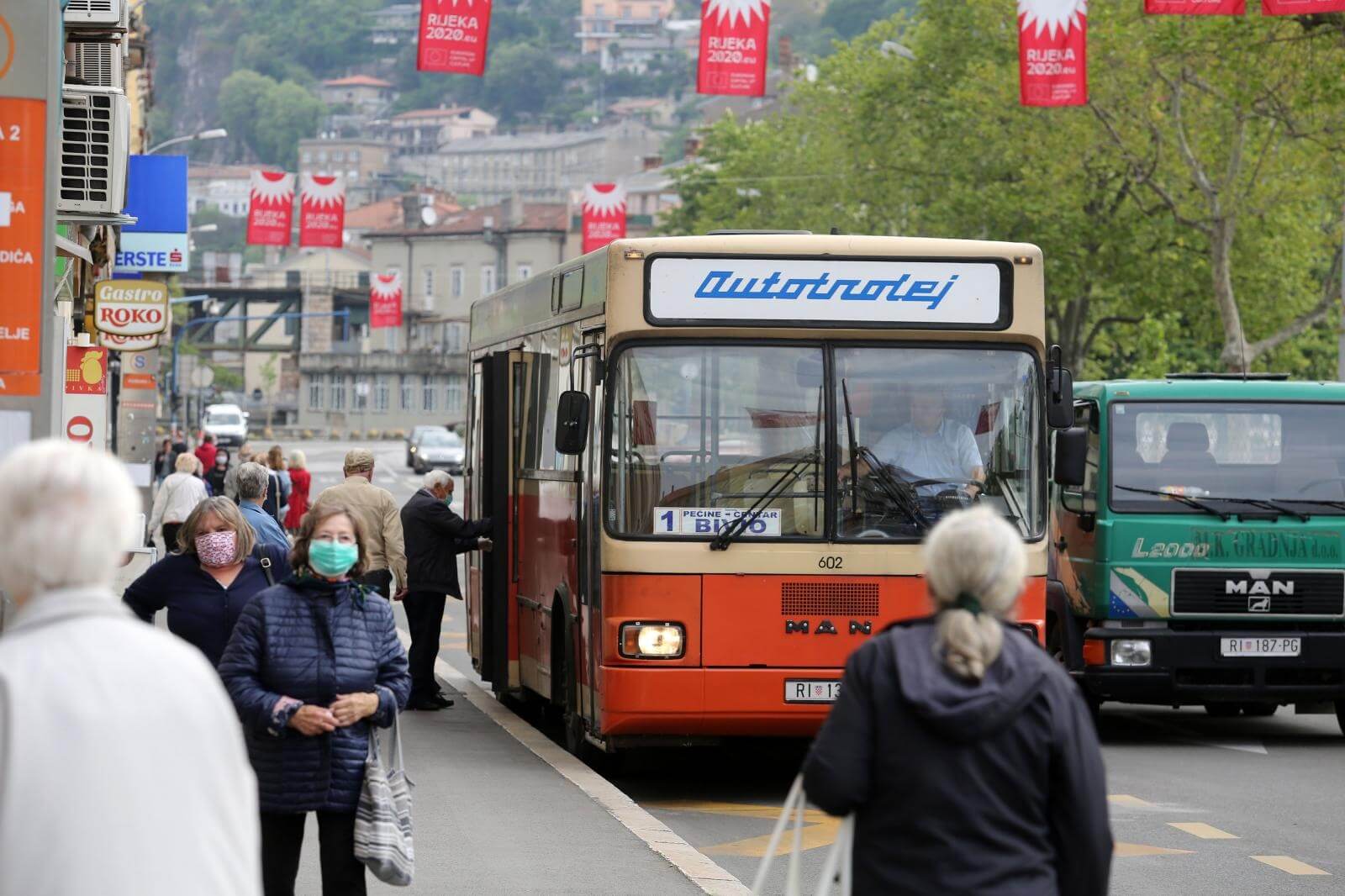
The buses in Rijeka (Photo: Goran Kovacic/PIXSELL)
In Split, as in Rijeka, you will find a network of buses that runs through the different areas of the center and the outskirts. Split public transportation company is called Promet Split. For detailed maps of their city and suburban lines, as well as ticket prices, check out their official website. Most of the locations within Split fall into Zone 1 in the company’s price list. Zone 1 tickets for a single ride cost 9kn when bought on Tisak, 11kn when bought on the bus. The daily ticket is 30kn.
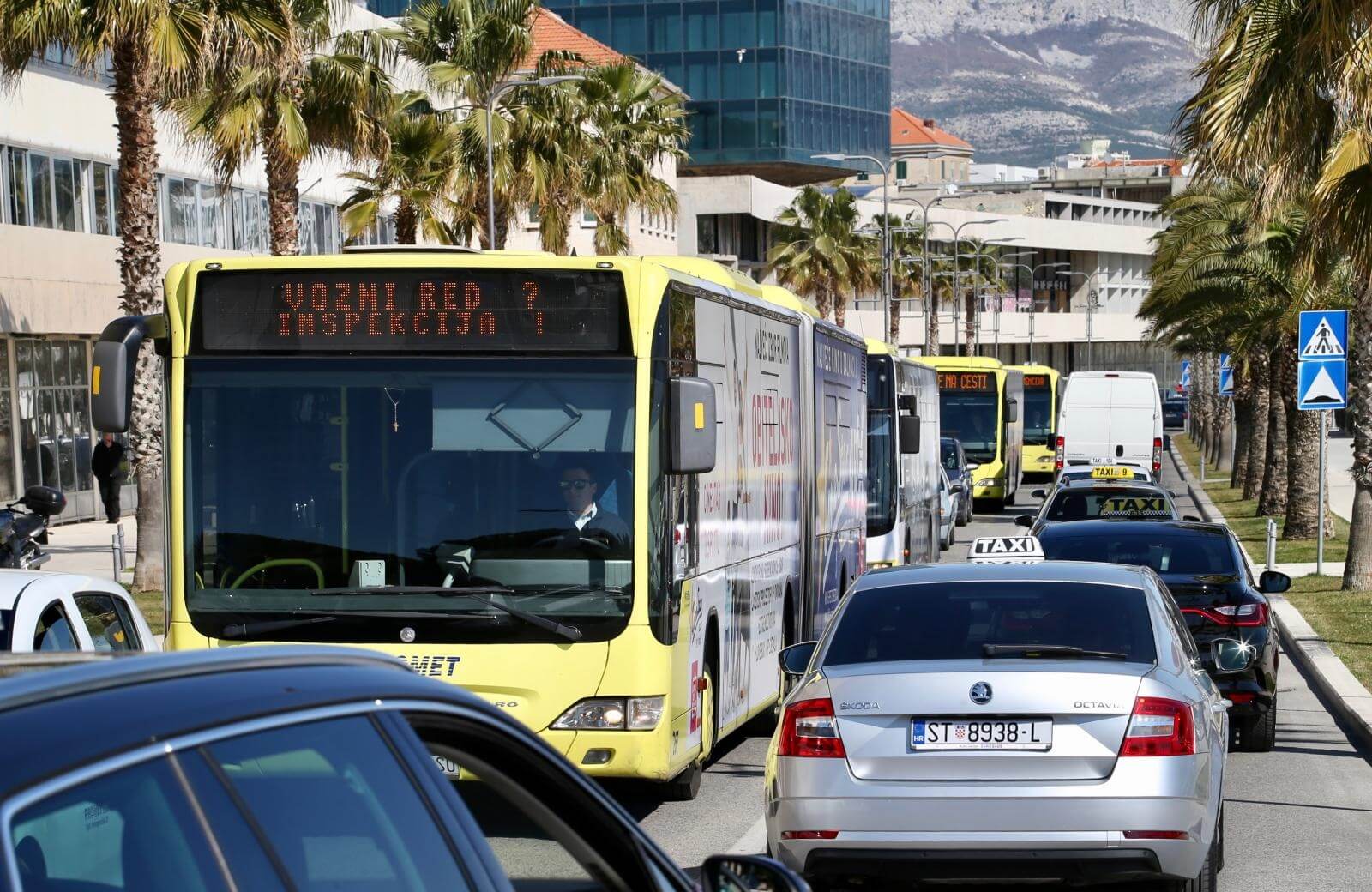
The buses in Split (Ivo Cagalj/PIXSELL)
Osijek was the first city in Croatia to have a tram system. In fact, trams still run through the city: it’s the only place in Croatia outside Zagreb that has trams. Osijek is a very pleasant city to walk around. Indeed, you can walk between all of the city’s key areas without barely leaving fantastic park ground. And we recommend you do just that. However, Osijek is also nicely covered by public transportation. In this case, that means cheap local buses and trams. Additionally, there are well-priced taxi services. It costs only around 20 kn to travel anywhere in the city (within 5 km).
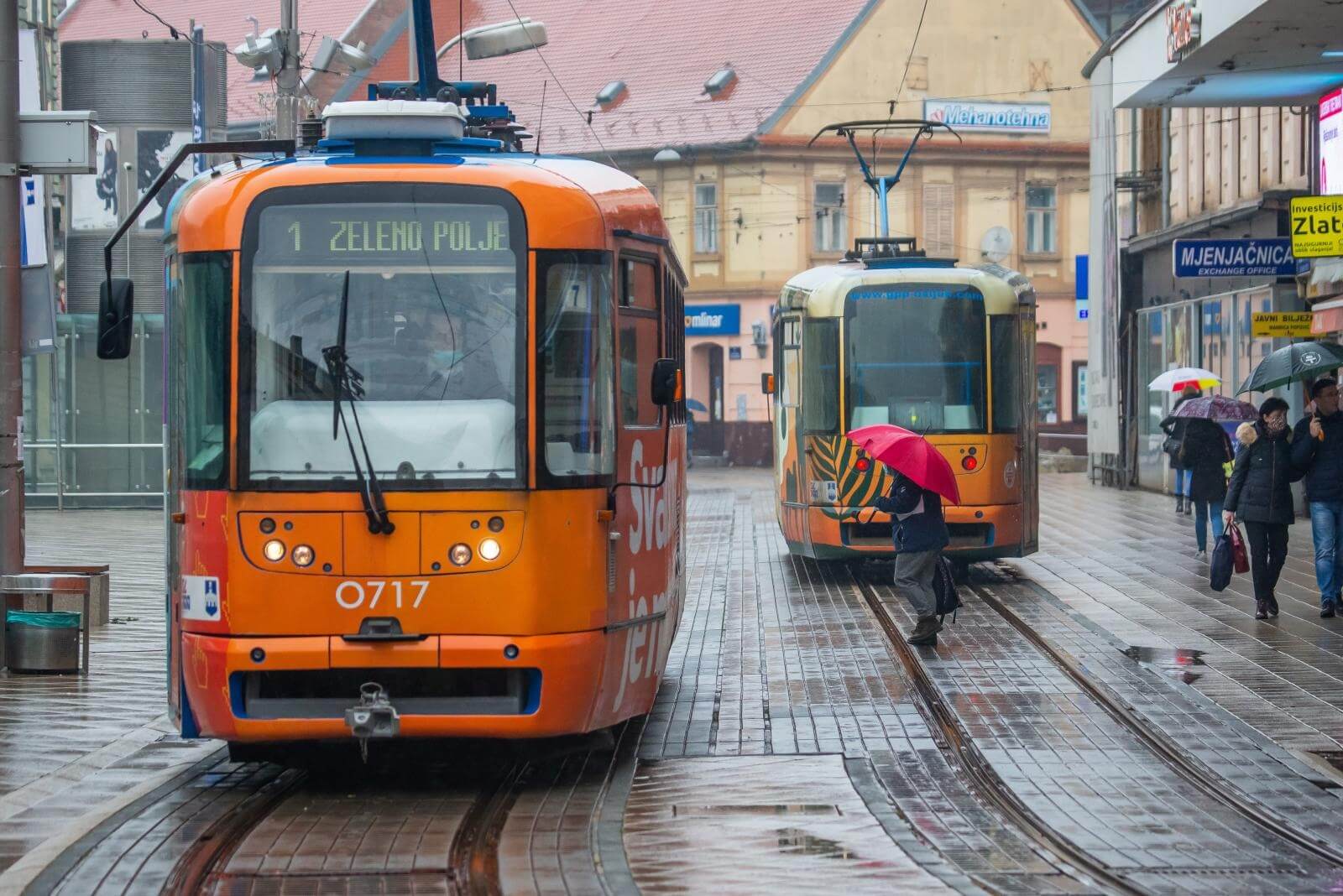
The trams in Osijek (Davor Javorovic/PIXSELL)
Not only will you find that it is easy to move from one place to another in the city, but that you will also be able to travel to all destinations in the country through buses and trains. If you're familiar with Uber, you'll be able to catch one anywhere in your city and even at late hours. Other options for Taxis are Cammeo and Bolt.
Health in Croatia
You will most likely arrive in Croatia with international health or travel insurance. Make sure you bring the necessary documentation related to that insurance. In case you need a consultation with a specialist or have to go to emergencies, contact your insurance before and after to cover the expenses. Medical receipts for those who are not enrolled with insurance can be ruthless. In addition, in pharmacies, it is essential to present a prescription to obtain your medications. A doctor assigned by your travel insurance can fill this prescription and mail it to you.
In case you are interested in public health insurance, especially if you wish to stay for a longer period of time even after the course ends, health insurance in Croatia is mandatory for all those who have temporary or permanent residence in the country, both ones with Croatian citizenship and foreigners. If you have an OIB, you can apply for Croatian health insurance. Check with the HZZO (Croatian Health Institute) offices if Croatian health insurance is right for you or if you are eligible. In the most likely case, you will have to pay the equivalent of the previous year to enroll, and you must not be affiliated with private or public insurance in your country of origin. Once enrolled, you will have to pay 500 kuna per month that will allow you to access prescribed medications, medical consultations, and cover expenses in the emergency room. Also, you will need to register with a GP.
To learn more about the healthcare system in Croatia, visit this guide from Total Croatia, where you will find information about specialists (some of them that speak in English), emergency numbers, hospitals, and insurance.
If you'd like to have emergency contact numbers handy, check out this Total Croatia page.
To learn more about Zagreb, such as places to see, things to do, museums, restaurants, bars, cafes, public transport, fun facts, events, and more, visit their Total Croatia page.
To learn more about Split, such as places to see, things to do, museums, restaurants, bars, cafes, public transport, ferry, fun facts, events, and more, visit their Total Croatia page.
To learn more about Rijeka, such as places to see, things to do, museums, restaurants, bars, cafes, public transport, ferry, fun facts, events, and more, visit their Total Croatia page.
To learn more about Osijek, such as places to see, things to do, museums, restaurants, bars, cafes, public transport, fun facts, events, and more, visit their Total Croatia page.
To find out more about what you need to know about Croatia, how to get around the country, destinations you can visit during your stay, and things you can do and see in these months, visit www.total-croatia.com, available in your language!
If you wish to learn more or have any questions about the Croatian language scholarship given by the Central State Office for Croats Outside the Republic of Croatia to study the Croatian Language in Croatia, send me an email to This email address is being protected from spambots. You need JavaScript enabled to view it.
Ivo Pilar Social Research Institute Expanding Scientific Cooperation in Sarajevo (BiH)
July 2, 2021 - Dedication to researching and developing the field of social sciences sees the Ivo Pilar Social Research Institute expanding scientific cooperation once again after Željko Holjevac's visit to Sarajevo, in Bosnia and Herzegovina.
The Ivo Pilar Social Research Institute, active as always, continues to expand its cooperation on scientifically explain social issues (symbolically noted as 2021 marks 30 years of the Institute).
As reported on their official website, Institute headmaster dr. Željko Holjevac visited Sarajevo, the capital city of the neighboring Bosnia and Herzegovina, from June 21-23.
The main story of that visit was a signed bilateral cooperation agreement between the Ivo Pilar Social Research Institute and the Sarajevo Catholic Faculty. The agreement was signed by Holjevac and Faculty dean dr. Darko Tomašević.
Additionally, Holjevac was at the reception with Vrhbosanski's vice bishop Vinko Puljić.
„They talked about possible shared projects that would be adjusted to the tradition, culture and developing needs of Croats in Bosnia and Herzegovina“, informed Ivo pilar social research Institute.
Croatian Cultural Society Napredak (progress) also met with Holjevac. Napredak soon celebrates 120 years of work and was founded at the start of the 20th century when the famous Croatian social scientist Pilar was active in Bosnia and Herzegovina. Napredak plans various manifestations for their big anniversary, and dr. Holjevac discussed the possible cooperation in organizing an international scientific symposium regarding the identity of Croats in Bosnia and Herzegovina.
Ivo Pilar Institute working in full speed
This sort of cooperation in regards to researching the Croatian diaspora in the neighboring country where the Croatian historical role and present is significant is nothing new for the Ivo Pilar Social research Institute.
As TCN reported earlier in May, the Institute, along with scientific partners, organized a conference “Identity of Boka Kotorska Croatians“, and the three-day event gathered crucial scientific institutes in Croatia to the town of Tivat in the Bay of Croatian Saints in Montenegro.
Scientists from the Institute were also active this year as they participated at European Conference For Social Work Research (ECSWR), International Society for Ethnology and Folklore (SIEF) Conference, and also by presenting a book on Croatian Mountain Rescue Service in Gospić, or by presenting book Cultural Identity of Vukovar – Contribution to Investigating Heritage and Successors“ – to list some of the activities TCN reported on throughout 2021.
As 2021 marks the 30th year anniversary of the Ivo Pilar Institute, apart from the aforementioned actions (to which we can include nurturing relations with scientific colleagues in Slovakia or opening a new research office on Vis Island), several more goals were envisioned by the end of the year: to publish the first edition of critical translation for the book „South Slavic (Yugoslav) Question“ by Ivo Pilar from 1918, and to make and publish Pilar's Kaleidoskop of Croatian society.
With the active academic dynamic demonstrated by the Institute, there is no doubt there is enough quality and capacity to achieve these goals. It is only a matter of time in such a busy and productive schedule.
Learn more about Croatian Diaspora on our TC page.
For more about science in Croatia, follow TCN's dedicated page.
Croatian Diaspora in South America: The Story of Nadia from Argentina
June 17, 2021 - Reuniting with your Croatian ancestry can go in many ways. Many of the Croatian diaspora in South America tirelessly seek to trace their roots, and several of them without success. The chances of accidentally meeting your distant relatives are always low, but this is what surprisingly happened to Nadia from Argentina.
Every year, lists are written in media and blogs everywhere to rank Croatian destinations, facts, and people, but I don't know if it has occurred to anyone before that Croatia, in addition to its beaches, its islands, its nature, its Roman, Venetian, Austro-Hungarian, and Yugoslav heritage, its geniuses (both in science and sport) and more, Croatia could also be known for its surprises. It is true that being Croatian, of Croatian descent, or living in Croatia can surprise one on various occasions, and not always in a negative way.
Of course, there are known surprises that one can get when going to the police station to carry out a procedure, or when sitting at the table of a Croatian family at lunch, or after a rakija tasting. But some of its most interesting events happen when reconnecting with your Croatian ancestry. Not only through my own experience, but I know of many, many people over the years who have failed to find out more about their ancestors rather than the simple fact that they were Croats.
As the years go by, it becomes more difficult to connect the evidence that one finds to solve numerous questions such as the year their ancestor was born, where they were born, when did they leave Croatia, why did they leave Croatia, what did they do while living there, what did they do after arriving at their new country, and so on. This is very difficult to solve, especially for the large Croatian diaspora in South America, a distant continent in so many ways beyond what’s measurable. If there’s something I know, it is that one of the decisions that can facilitate this search is to return to the mother country. It is not a guarantee, but it can definitely bring you closer to the answer you are looking for.
But what if one is not looking for it? It does not mean that there is no type of interest, but precisely it ceases to be a priority when it becomes so difficult to know something about our origins. When you find something you were looking for, it always brings a pleasant sense of success and fulfillment. But when it is unexpected, the feeling of joy can be equal or even greater. This is what I thought when I first heard about Nadia's experience. But I feel like the story will feel more magical if it is shared through her own words. Meet Nadia Milevčić, a returnee from Argentina.
What country are you from and when were you born?
I am from Argentina, I was born in Buenos Aires in October 1994.
When did you know that you were of Croatian descent?
I can't give you an exact date because it's something I've known for as long as I can remember. Perhaps because of my last name, the fact of being of Croatian descent was always something very present. My dad's four grandparents were Croatians and he talks a lot about them and the things they taught him. My grandmother, daughter of Croats, used to speak to me in Croatian when my brother and I were young. She also told me about our family, about the city of Split in Dalmacija, and about the history of Croatia as a country. For all these things, the Croatian heritage was very important in my family.
When did you decide to travel to Croatia and what motivated you?
In 2018 I started thinking about studying abroad because I wanted to have the experience of living in a totally different environment from mine. First I thought that this trip would be related to something in my career. At that time I had two years left to finish my Bachelor of Arts degree and I looked for some scholarships in other countries, but nothing appeared.
I started thinking about studying in Croatia when I went to the Buenos Aires embassy to find out how to begin the process of Croatian nationality and the woman who worked there told me about the Croaticum program. It seemed to me that the idea united my desire to live in a totally new place and also my desire to finally know that country that I had been told so much about. In March of that year, I began to work on my project and began to study Croatian in Buenos Aires while waiting for the opening of the call for the scholarship program. That year I applied but did not win. It was very disappointing, but later I understood that it was not yet my time to leave Argentina. In 2018 I also finished the annual Croatian course and continued to search for papers that could help me to prove my Croatian ancestry more clearly.
In 2019, the last year of my degree, I applied for the scholarship again and won it. That same year, a distant cousin of mine contacted me from Croatia saying that we were family. At that time my idea was not only to get to know the country of my great-grandparents and live in it for a while but also to reestablish the bond with the rest of my family in Croatia, of whom I did not know any of them.
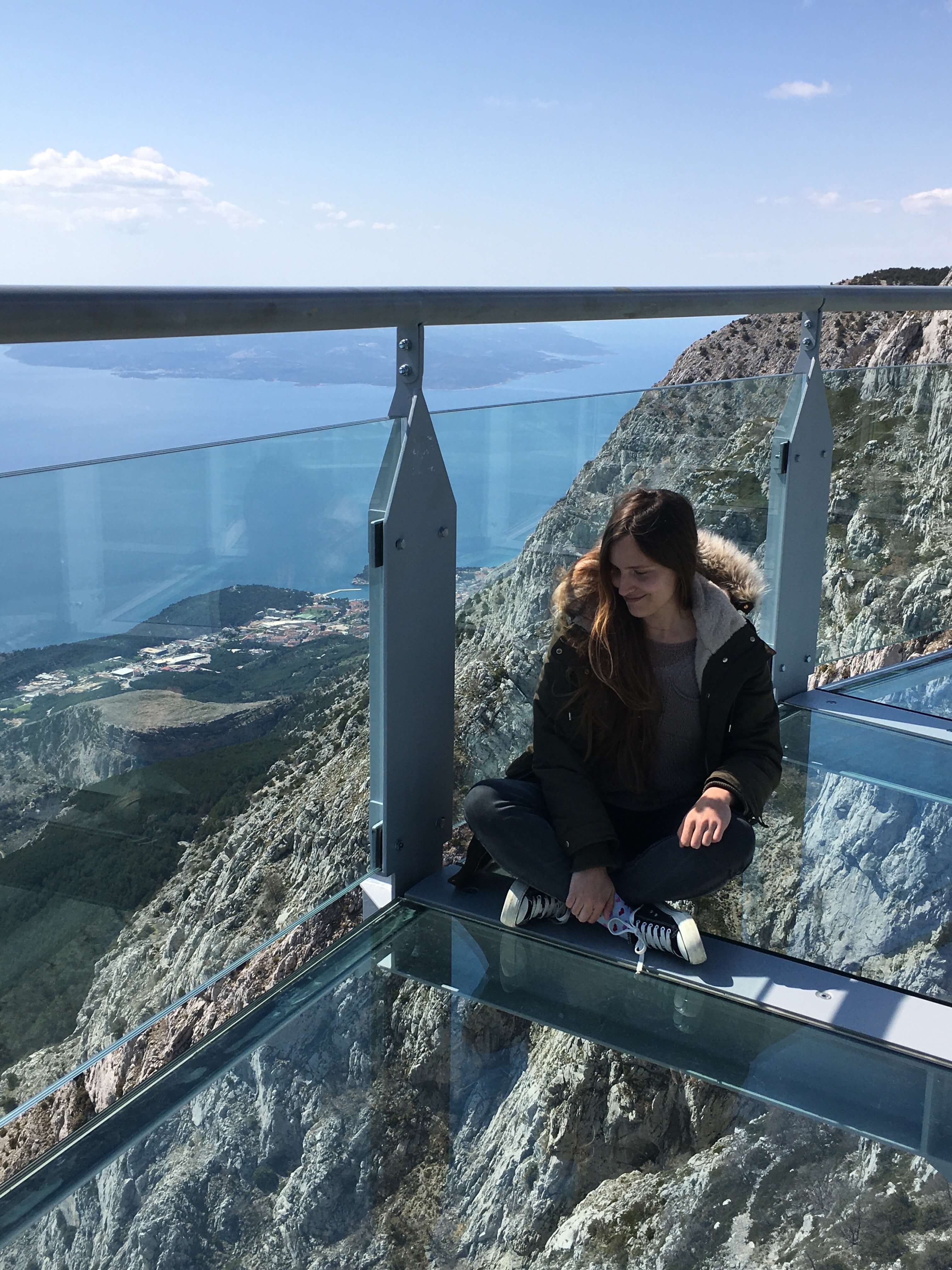
Nadia on the popular Biokovo Skywalk, the same day she met her distant Croatian relatives. (Personal album)
What was your impression when you first arrived?
My first impression of Croatia was that everything was very beautiful and that the people were very friendly. When I met my cousins they seemed to me to be very open and very loving people. The first month I was delighted with everything I saw, it seemed to me that everything was very organized and I felt very safe.
How did that impression evolve over time?
After living here for a year and having moved several times, I also began to see the negative side. All countries have something good and something bad, it is normal. There are things that I don't like and I think that's part of living in the reality of a country and getting out of that stage of infatuation in which I was at the beginning. Now I have a more realistic impression.
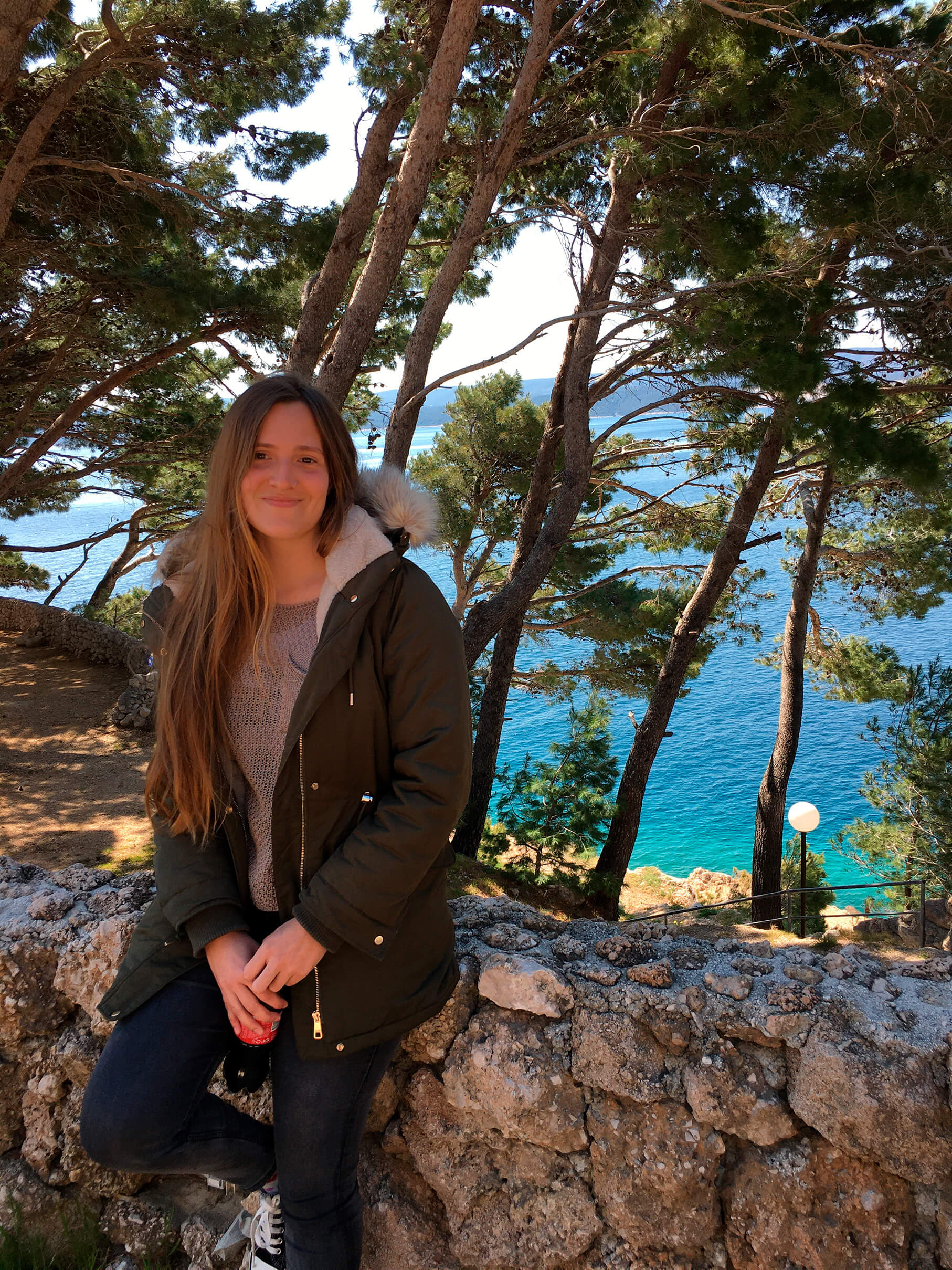
Nadia was born in Buenos Aires, Argentina, in 1994. All of her grandparents are Croatian. (Personal album)
What did you know about your relatives in Croatia?
It was always quite a complicated story because all of my dad's grandparents are Croatian and most of them had a very large family. I know a lot about my great-grandmother Ermenegilda Stanić because they were like twelve siblings and my grandmother went to Argentina because my great-great-grandfather arranged her marriage to a rancher so that she would have a good future in financial terms. When she arrived in Argentina she fell in love with my great-grandfather Duje Runje, a Croatian who worked as a laborer in that ranch. Obviously, it was something very strong for all of his family and my dad always talked to me about the two of them. He doesn't have much information about his paternal great-grandparents because my grandfather, Spiro Milevcic, died when my dad was four years old.
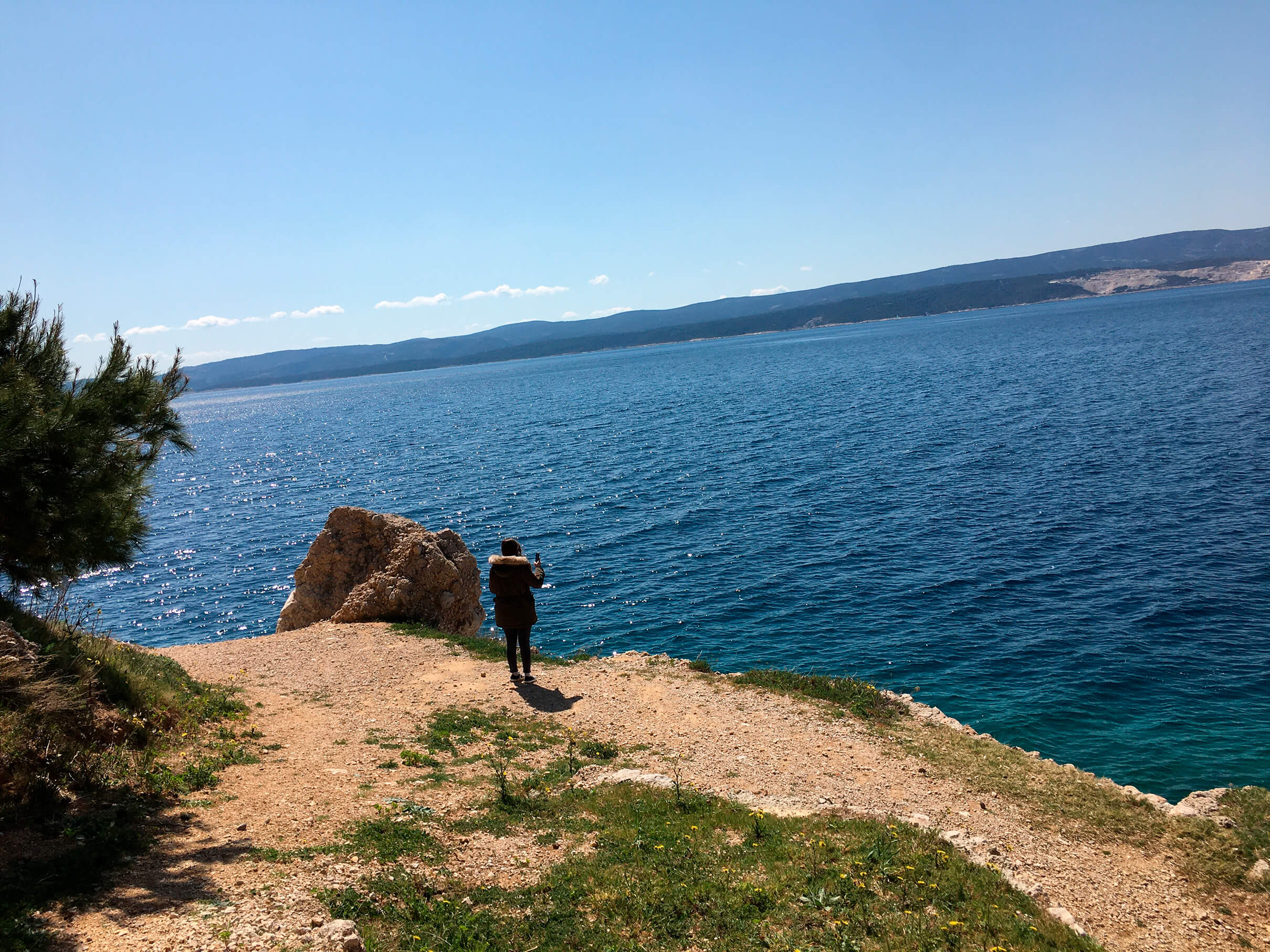
Nadia, who was living and working in Rijeka at the time, decided to travel to Dalmatia for vacation. She hadn't planned to find out about her family on the trip. (Personal album).
Did you have any expectations or plans to meet them?
Yes, my dad has a book that the Stanić family wrote about the descent of the twelve siblings. All the names appear there, including mine. The whole family has it and thanks to that my cousin contacted me from Croatia. It was just the same year that I won the scholarship. She told me that she lived in Rijeka and thanks to that I chose this city as the place where I was going to study for the Croatian language scholarship. This is how I met the descendants of one of the Stanić brothers, but I also knew that she had much more family in Croatia. Last year I didn't meet anyone else because most of them live in Dalmacija.
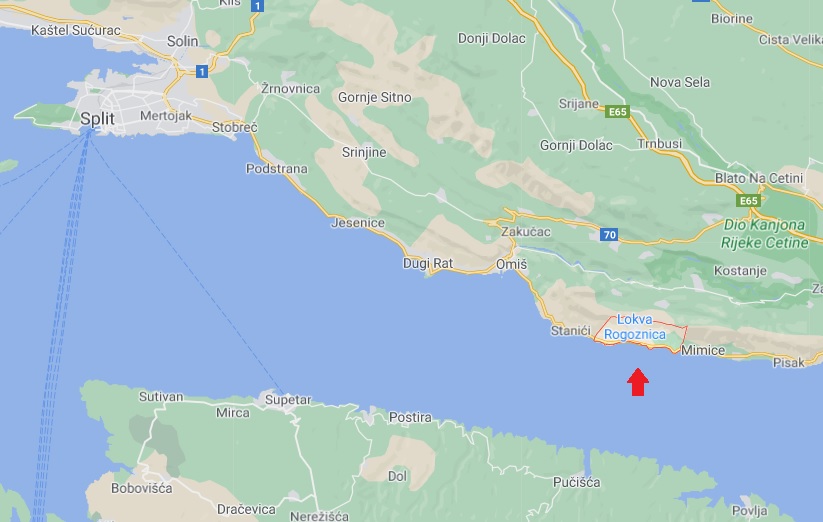
Lokva Rogoznica is a Dalmatian town, one hour away south of Split and 10 minutes away from Omiš. (Google Maps)
The day you met your distant relative, what were you doing and where?
Last month I went on vacation to Split and decided to go to Lokva Rogoznica, a town about an hour away because my great-grandmother was born there. My dad and my Croatian cousins had asked me to go meet him, but it was not my plan to look for anyone there, just take a couple of photos and see what the place was like.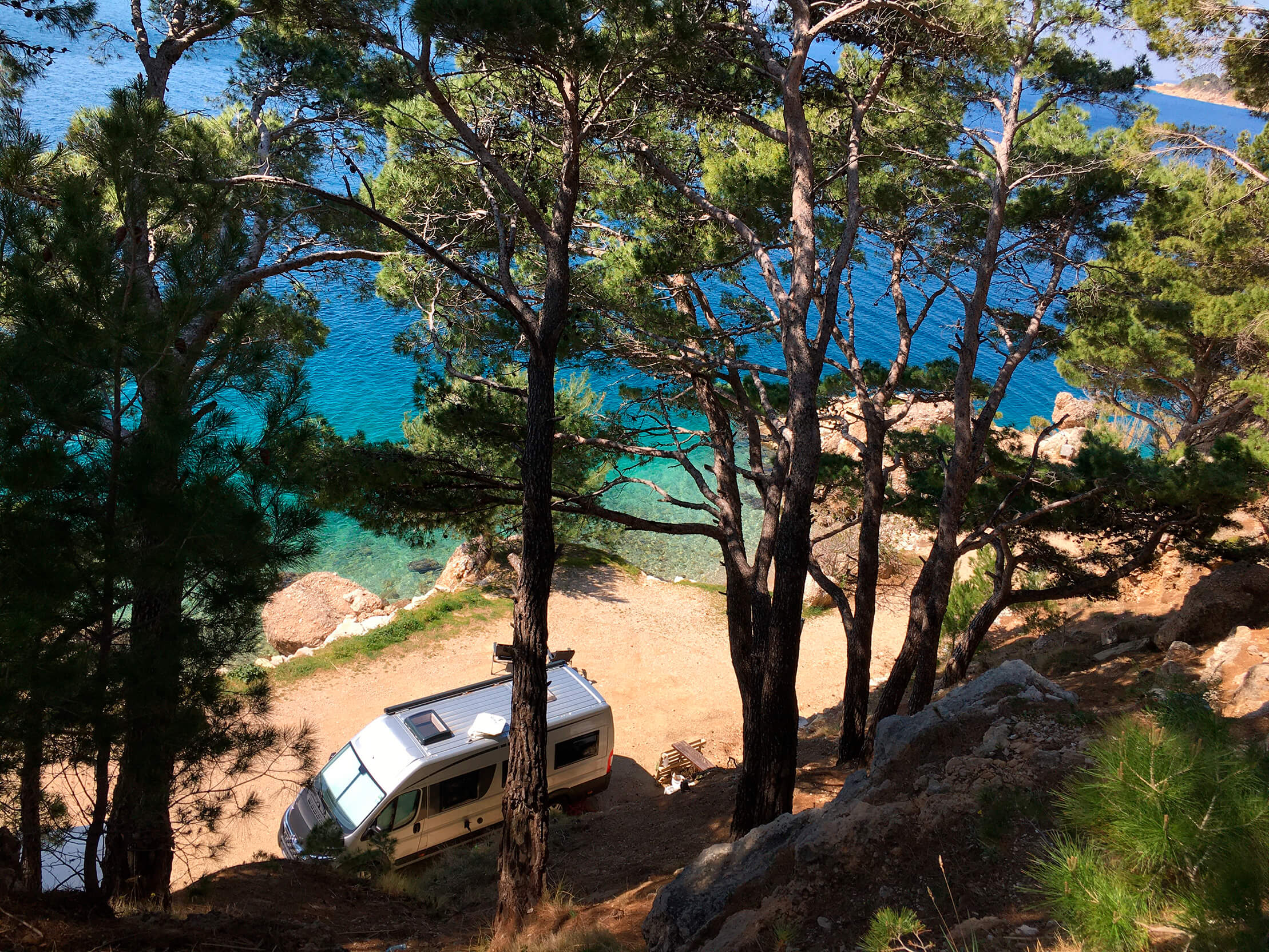
''La Sirena'' autokamp, in Lokva Rogoznica, the town where Nadia's family originated. (Personal album).
How was the encounter?
We stopped at a sign on the route to take a picture of me and we wanted to go down to the beach. I saw that there was a sign for an autokamp and that the beach was private. I remembered my cousins telling me that one of the Stanić was the owner of a campsite somewhere in Dalmacija, but I didn't know where. When we were about to go down to the beach, the owner of the campsite appeared and told me that the beach was private and that we couldn't enter. I don't know why it occurred to me that this could be my relative and I asked him if his last name was Stanić. He said yes and at that moment I told him that we were family because I was Ermenegilda's great-granddaughter. At that moment his face changed completely and he asked me if my great-grandmother had traveled to Argentina. When I said yes, he came closer to me and gave me a hug, and introduced himself as Milan Stanić.
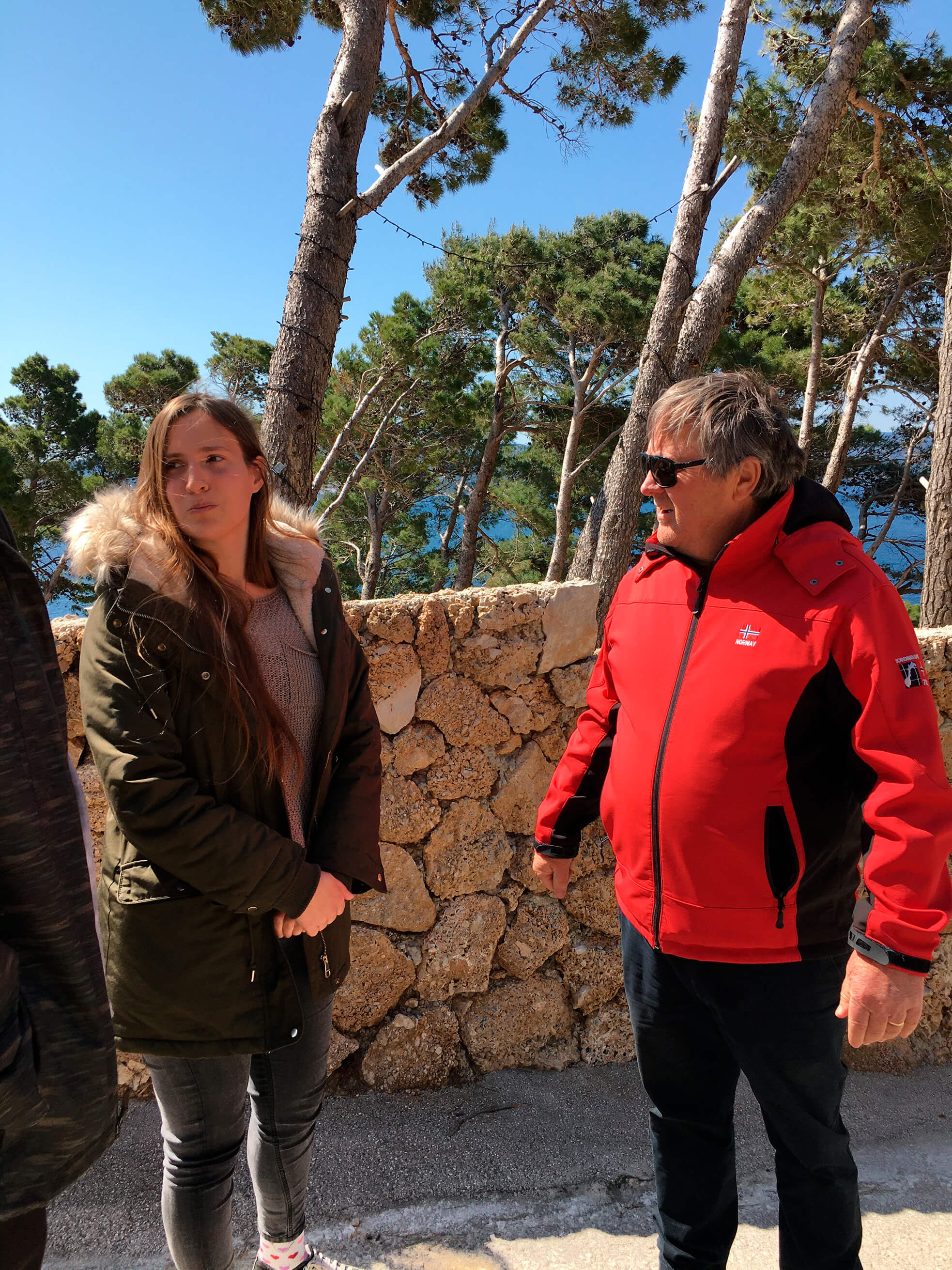
Nadia, soon after she met her distant relative, Milan Stanić. (Personal album)
How did you feel when the last names matched?
I felt very good and very strange at the same time. I was thinking of my dad because his desire was always to meet his Croatian family. I was the first person in my family to return to Croatia and from the first moment, I felt that it was my task to re-establish the bond with the other descendants. I also thought that I had come to take a photo and I ended up leaving with one more piece of my family. I like to think that it was something that had to happen and that it was time for us to meet.
What was his reaction when he found out?
He was very excited and very happy. From the first moment, he was very open with me and he introduced me to all of his family. That day we had lunch and dinner together. It was a very nice moment because all his daughters and his wife welcomed me very well and everyone was interested in talking to me.
Are you still in touch with him?
We don't talk every day, but I have his number and my cousin’s Facebook, so I can let them know the day I'm going to visit them again. They know that I am living in Rijeka and that I am working, but that at the end of the summer I am going to travel with my brother so that he can meet them too.
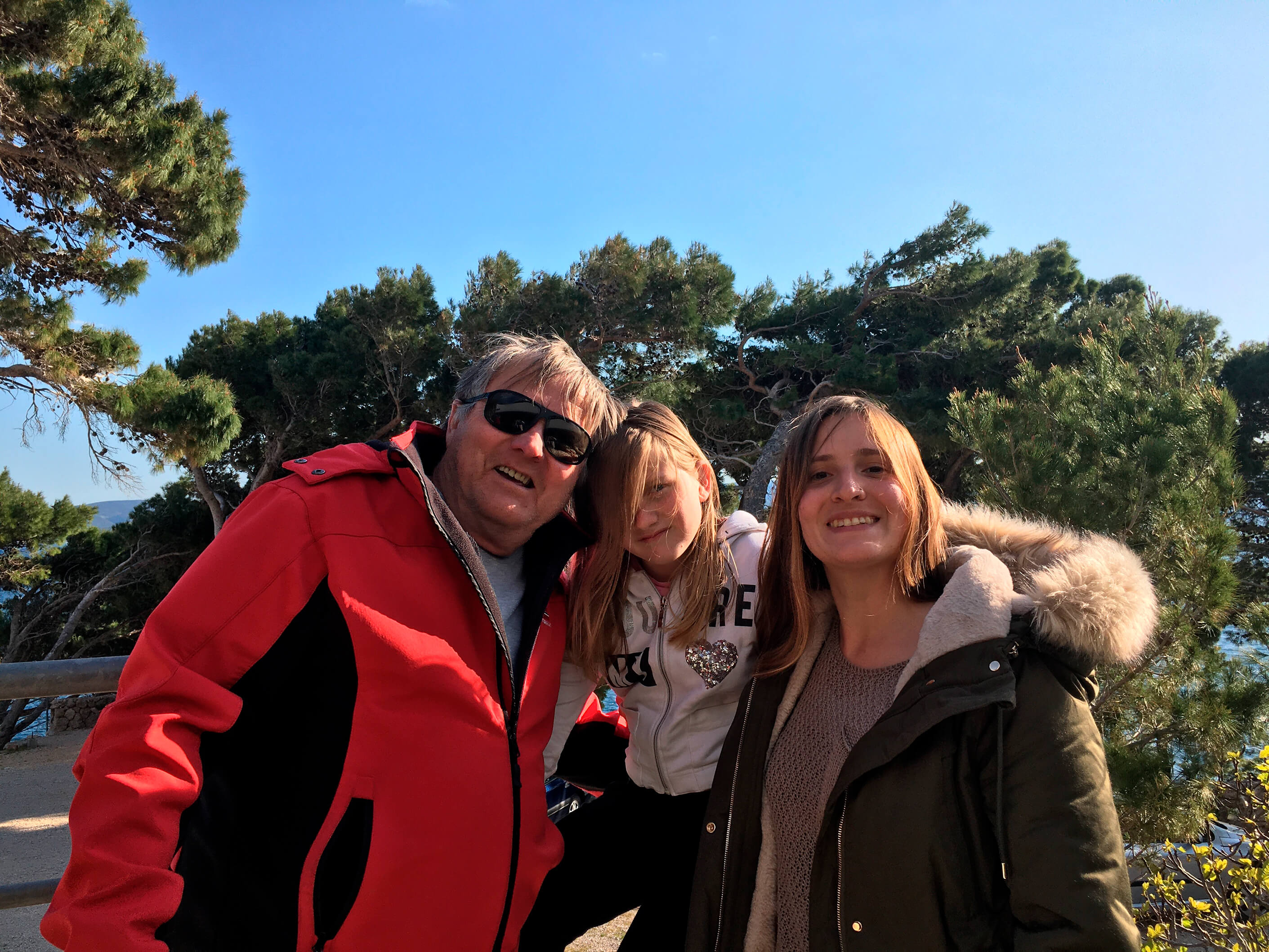
Milan, his daughter, and Nadia. (Personal album)
What is your goal in Croatia? Would you like to stay?
My idea of Croatia totally changed over time. When I arrived I planned to stay for only four months to study, but then I applied again for a second semester. I think that the decision to reapply for the scholarship was no longer motivated by the desire to know another culture, but was related to the fact that I felt good in Croatia and that I still did not want to go back to Argentina. Nowadays I am more established with the Croatian language and culture, but I cannot tell you that I want to stay permanently. I feel a strong connection to Croatia, but I also have my best friends and family in Argentina. Every day I miss my country and the people who live there and that is why I know that I will return to my country at some point. I sincerely feel that one half is here and another half is there in Argentina and for that reason, I would like to go and come back, spend some time in each country. I think it is a decision that is made every day. I can only tell you that today I choose to stay here.
The Croatian diaspora in South America is one of the largest in the world, and we at Total Croatia and Total Croatia News are committed to developing more on the subject in the coming months. If you belong to the Croatian diaspora in South America and want to share with us a story of reuniting with your distant relatives or your experience living in the land of your ancestors, you can send an email to This email address is being protected from spambots. You need JavaScript enabled to view it..
For more about the Croatian diaspora in South America, visit our dedicated page here.
National Federation of Croatian Americans Cultural Foundation and Croatian Fraternal Union To Celebrate Thirty Years of Croatian Independence
June the 14th, 2021 - This article was co-written by Steve Rukavina and Anna Maria Sicenica, NFCACF Board Members.
On Saturday, June the 26th at 11:00am Eastern time, the NFCA will be co-hosting with the Croatian Fraternal Union, a global webinar salute to the founding of the Republic of Croatia's democracy. The NFCA’s webinar will celebrate the 30th Anniversary of Independence Day and the honoring of another “Statehood Day” (1990 milestone) and Croatia’s successful and historic road to democracy and its independence achieved especially in the 1990-1991 time frame.
Please let us invite you to a virtual celebration to mark thirty plus years of Croatian Independence (Croatian: Dan Državnosti), filled with traditional Croatian music and notable speakers. This event, as stated, will be held on June the 26th via a webinar to benefit the Special Olympics organization in Croatia!
Register Now for the 30th Anniversary of Croatia's Independence Celebration Webinar
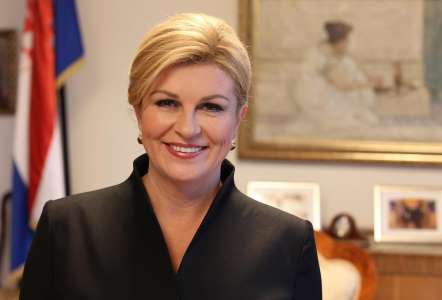

We will also commemorate this momentous day with keynote speeches by Kolinda Grabar Kitarović, the former President of the Republic of Croatia, and Peter Galbraith, the first U.S. Ambassador to Croatia. We are honored to feature co-headliners like these two very prominent diplomats and principals whose leadership to assist Croatia's developing democracy was so instrumental at critical junctures over the past thirty years.
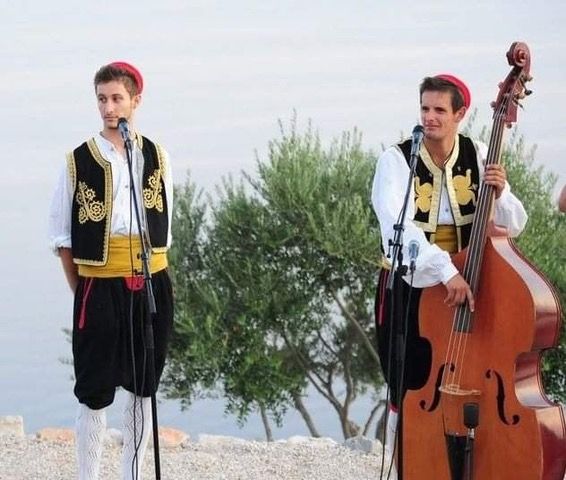
Independence Day festivities will include a live singing performance from Dubrovnik. Petar Sambrailo (left) and Marijo Anđelić (right), are well-known 1st and 2nd tenors in the Croatian Klapa world. Both have performed with the group Klapa Kaše, who have won many awards at Klapa festivals throughout Croatia.
Finally, athletes from the Croatian Showshoeing Special Olympic Team (which qualified for the Russian Special Olympics World Winter Games in 2022) will talk to us about their sport and their achievements. Founded back in 1992, the Special Olympics in Croatia has forty affiliated chapters all over the country and brings 16 sports to over 1,300 Croatians. The organization's mission is to provide year-round sports training and athletic competition in a variety of Olympic-type sports for children and adults with intellectual disabilities to develop physical fitness and to find joy in the participation of sports. Croatia's Special Olympics organization has been led by Executive Director, Franjo Horvat and associate Sladjana Tatic for over twenty years.
The NFCA has four primary sponsorship tiers from $100 Bronze to $250 Silver from the $500 Gold to the $1,000 for the Platinum level. Of course, donations of any amount are welcome and encouraged! 100% of the sponsorship proceeds and earmarked funds raised during this event will go to Croatia's Special Olympics organization. The NFCA is very proud to be a major sponsor and partner of this truly incredible organization. For inquiries about donations, please contact Steve Rukavina at This email address is being protected from spambots. You need JavaScript enabled to view it..
We hope you will join us for a wonderful seventy-five-minute event full of Croatian music, culture, and history on June 26th from the comforts of your home whether you're in Croatia, anywhere globally or here in the USA!
Marija Bistrica to Host Int'l Conference on Croatian Diaspora
ZAGREB, 5 June 2021 - Marija Bistrica will host on 10-11 June an international conference focusing on numerous topics of importance for Croatia's expat communities and the relationship towards them, the Croatian Heritage Foundation has announced.
The live conference is a continuation of the 4th Croatian Emigrant Congress, which was not completed in Zagreb last November due to the pandemic.
About 60 participants will analyse the challenges and prospects of Croatian emigrants in relation to the homeland, demographic challenges, and emigrants as promoters of Croatia.
The event will also be an opportunity to talk about the aid expats sent via their Catholic missions to the areas of Croatia struck by last year's earthquakes.
A cultural evening dedicated to the Croat community in Kosovo will be organised on 9 June, including a photo exhibition.
For more about the Croatian Diaspora, follow TCN's dedicated page.
Identity of Boka Kotorska Croatians - Scientific Conference by Ivo Pilar Social Research Institute
May 12, 2021 - Earlier in May, Boka Kotorska, in the town of Tivat in Montenegro, was the host of the scientific conference "Identity of Boka Kotorska Croatians" which will introduce changes in Croatian education.
Croatia has a big diaspora, no secrets there, but its worldwide spread makes you miss the region.
In Boka Kotorska, in Montenegro, Croatia's first neighbor on the southern border after Dubrovnik, not only is there a huge population of Croatians, but they also have a significant cultural impact on the area. So significant it even calls for social science to step in.
As Ivo Pilar Social Research Institute reported on its website, May 6 to 9 saw the conference “Identity of Boka Kotorska Croatians“. The three-day conference gathered crucial scientific institutes in Croatia to the town of Tivat in the Bay of Croatian Saints. Headed with Ivo Pilar Social Research Institute, Croatian Catholic University, Croatian Studies Faculty, Institute of Croatian Language and Linguistics as well as Institute for Historical Sciences in Zadar attended the conference while Croatian ministries of European, and Foreign Affairs, Science and Education, Culture, and Media, as well as Croatian Central State Office for Croatians Outside of the Republic of Croatia, founded the event.
„The scientific conference went well as well as signing conclusions with recommendations that that knowledge on Bokelj Croatians we learned on this conference enter the Croatian national curriculum in important subjects. These conclusions are the crown of our efforts to launch this conference in public, not just in an academical way, but to massively popularize to ensure long-term benefits for Bokelj Croatians as for every educated citizen of Croatia and Montenegro“, said Dr. Željko Holjevac, head of the Ivo Pilar Social Research Institute.
Conference conclusions suggest additions to the curriculum documents on key definitions of Croatian National Identity to make space for Croatians outside Croatia, including Boka Kotorska Croatians. Identity features and creativity of Bokelj Croatians in Croatian education, and the book „Boka Kotorska - the Bay of the Saints and Croatian Culture“, by Vanda Babić to be the mandatory literature for tourist guides in Montenegro.
Final meetings at the conference, as well as sailing with a „Katica“ ship through Boka Kotorska Bay, Saw the participation of Boris Bastijančić, the advisor and representative of the Montenegro president and representer of Croatian parliament and MP, Zdravka Bušić, and others.
„I'm glad to be at this scientific conference, and I want to thank everyone's effort for something like this to happen in Boka Kotorska. I would especially like to thank students that took part in this and gave their part as young people who love the truth of Boka, the place of saints. This is a message that we too need to do something to mark this time with love, hope, and faith“, said the Kotorska bishop, mons. Ivan Štironja.
Some Croatians live outside of Croatia, but maybe you would want to live in Croatia. Learn more about living in Croatia on our TC page.
For more about the Croatian Diaspora, follow TCN's dedicated page.
Peru to Croatia: Returnee Perspective Two Years Later
April 17, 2021 - Two years ago I moved from Peru to Croatia. Thousands of returnees like me are hurting each year to leave our countries behind. But we have to look forward.
My parents taught me and my siblings from a very young age to value and appreciate the best of Peru: its people, our history, our culture, our traditions, our food, our ecosystems, and much more. That, no matter what, we should always speak with pride of our country when a foreigner asks us about it. In the same way, and as we have grown and had experiences that eventually proved it, we learned to recognize that there were not just one or two, but an immeasurable amount of problems in our country. And that we needed to recognize those them, criticize whoever we had to, and work on solutions to overcome those problems.
We have normalized a very harmful lifestyle, in which parents always say goodbye to their children when they go out to study, work, or with their friends with a ‘‘please, take care of yourself. Let me know when you arrive and let me know when you return’’. We have normalized discriminating against our compatriots based on where they live, the color of their skin, their way of speaking, and more. We have normalized reducing women to the minimum expression within society. We have normalized attacking gay or trans people and even make them invisible among the population. We have normalized that our natural resources should be exploited at the cost of the destruction of our environment and our Andean and indigenous communities. We have normalized electing politicians who represent self-interest and destructive ideals. We are now living in a country where everything is normal and terribly wrong at the same time.
The day came when I moved from Peru to Croatia. As I landed at the Franjo Tuđman Airport in October 2019 and looked down at the city of Zagreb, I thought about how I could put all my personal conflicts behind, but I couldn't help but think that I was leaving all that I had normalized for so long. It is part of who I am now. And not all of it was bad.
Six days ago, in the midst of one of our worst moments during the current pandemic, Peru held its presidential and congressional elections. I had distanced myself from political discussions about my country for the simple fact that I did not feel that I could really contribute something real while being so far from there, except for voting.
After an atypical electoral day, the electoral results seem to indicate that there will be a second round. Between whom? One for sure is a radical left candidate, named Pedro Castillo; and the other is Keiko Fujimori, recently released from pretrial detention on charges of corruption and money laundering, and daughter of dictator Alberto Fujimori.
Likewise, it is almost definite that our congress will be represented, in its majority, by ultra-conservative political parties. I followed most of the election day on social media, and I felt everyone's concern and confusion from a distance. It is true that Peruvians may be surprised one day in one way and the next in another, but something is very true and that is that difficult times are coming for women’s rights and the LGBTQ community.
It was during these recent weeks that I tried to imagine all the possible scenarios my country would face with each candidate, and I realized that despite all my attempts to assimilate that my life had already taken another course here in Croatia, I am still Peruvian and the problems of my friends, family, and compatriots are mine as well.
Most of the people I have met here in Croatia were surprised when I said that one of the reasons I came here was to flee the toxic environment of a country steeped in corruption, lack of opportunities, and insecurity on the streets. ''Peru to Croatia? Don't you know we have a corrupt country as well?''. I get that a lot.
I know that I could spend hours discussing and demonstrating that the political situation not only in my country but in the entire continent is much more serious, but I do understand what they are trying to tell me. In the same way, I see that there is also a very complex situation regarding the migration of young Croatians for better jobs and wages in Europe and even beyond. We are different, definitely, but not as much as I thought. There’s no perfect country, and the margin of improvement is huge.
It is when I process all this information that I can reach a very valuable conclusion, and it is about the responsibility we have as citizens of a country or immigrants, and even more so if we are both at the same time. And this is something that I have learned a lot in recent years, meeting several South Americans of Croatian descent here: we run away from something, and at the same time we do not run away at all. It doesn't matter how far away we are.
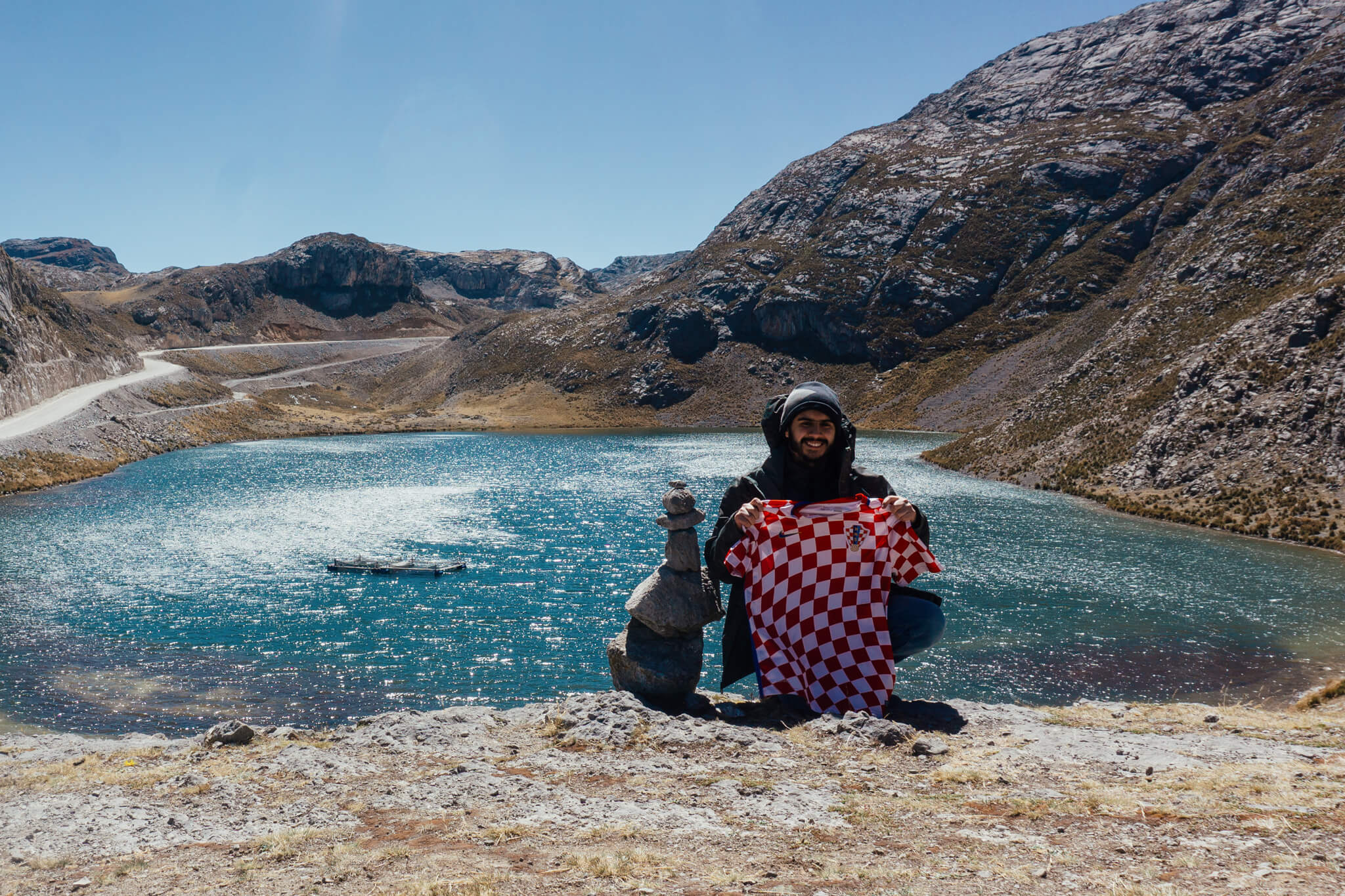
It is now that I think of Pero Kusijanović, our ancestor who left the small town of Mokošica and set out for Peru almost 150 years ago. I think of my grandmother, who left everything and went to Spain. I think of my aunts, who have lived in the United States for approximately 30 years. I think of the millions of Croats and Peruvians who have historically migrated to leave everything behind and seek a better future ahead. But is it worth keeping looking back once we made it out?
I think this was told to me by my psychologist a few years ago, but it's an analogy that I really appreciate, about the idea of moving forward and leaving something behind. He told me that life was like driving a car. We cannot drive just by constantly looking at the rearview mirrors, taking into account that we can hit someone or something in front of us. Just as we cannot drive without seeing them, because we could be hit by someone or something behind.
What I believe is that we have a great responsibility to raise the best of our countries whenever we have the opportunity, as well as to be critical and reflect on what is really wrong there in the distance. I know it is difficult to think about the idea of change or the way we can be part of it when the only thing that brings us closer to our country are social networks and the news, but it is a matter of being patient and being prepared when the opportunity arises. Be proud, be critical. Moving from Peru to Croatia distanced me physically from my country, but not entirely.
I cannot say, however, all of the above without finishing by saying that at the end of the day we are not just Peruvians, Chileans, Argentines, Bolivians, Venezuelans, Colombians, Ecuadorians, Brazilians, Uruguayans, Paraguayans, or Croats. As human beings, it is also important to ensure our happiness, our goals, our mental health, and the well-being of our families. Sometimes the best choice (sometimes the only choice) is to climb on a plane and fight it off elsewhere, even if it hurts. The decision of moving, migrating, and leaving everything behind is something we should never be ashamed of.
If there is one thing I am sure of, it is that I am happy to know that the place I went to was Croatia. Why? It is a country that has suffered as much as mine in the last 40 years. There’s so much to be done, but so much to be proud of. That way, I won't lose sight of where I come from, and the mission I still have to accomplish.
In the next weeks, TCN will be working on a series about the South American Diaspora in Croatia. If you're part of the South American Diaspora in Croatia and would like to share your story, send an email to This email address is being protected from spambots. You need JavaScript enabled to view it..
For more about the Croatian Diaspora, visit our dedicated page here.
Inspiring Croatian Diaspora Story: Dusica Hoban – Making Individual Donations to Croatia from UK
March 27, 2021 – In an inspiring Croatian diaspora story, meet Dusica Hoban, a woman who has been helping Croatia with her selfless donations.
In the last 6 years, I was part of the team that organized — Meeting G2 — a business conference for Croatian Diaspora. It was an exciting project that allowed me to meet a lot of Croats from the diaspora and to discuss their ideas, wishes, but also problems and obstacles that they are facing when coming to Croatia and trying to do business here. Through the Crowdfunding campaign that I did for Visnjan Observatory, I also met Dusica Hoban, who dedicated a lot of her time and financial resources to helping people in Croatia. Since I found her motivation and results rare in Croatia and the Croatian diaspora, I proposed doing a short interview. Hopefully, her enthusiasm will inspire others to similar actions or to connect with her and maybe in the future to create some humanitarian trust.
1. For the beginning, share with us a bit about your background story? How long are you living in the UK, and what are you doing right now?
I was born in Pazin, and from 1966 I lived and studied in Sweden. From 1972 I lived studied and worked in the U.K. For many years I worked in the NHS in finance and business management. Following several personal tragedies in 2004/5, I had to leave that work and rethink how to survive financially to enable me to continue to support myself and my two children, to finish the private education system and universities. That is when I took steps to start investing and have continued to do so to this day.
2. How did you come to the idea to help Croatian people, institutions, or the state in general?
My charitable effort really started with a Moldovan boy Andre, around 2006/7. This boy had a hole in his skull when an electrical cable fell on him; at that point, he had not been outside for three years to prevent infections. The local doctors only managed to patch up his skull with some skin, but what he actually needed was a metal plate and many operations performed in the U.K. over a period of two years.
Andre successfully recovered and learned fluent English at a private school in Surrey, which was not far from the hospital where he was being treated and staying with a compassionate English family.
As I was being updated on Andres's progress, it made me realize how important it is what we individually do for others…in some cases literally saving their life.
The reason I have decided to focus primarily on helping in Croatia is following a talk at the Croatian Embassy in London. The talk was by EBRD Bank, about the integration of Eastern European countries into the EU. I was shocked to hear that Croatia was the country they were concerned about the most, even falling behind Bulgaria and Romania. At the end of the talk, I challenged the speaker to explain Croatia, and his short answer was - Croatia lacks quality people…This came as a huge shock to me!
3. What types of projects are you aiming at?
I have been aiming and concentrating mainly on a humanitarian concept, although I have been known to dip into culture and education.
4. You participated in Visnjan Crowdfunding, did you had other successful ideas or projects that you backed up or initiated?
This is the list of projects that I supported in the last few years:
2017 — Pazin School (books, English club)
2017 — Maggie’s, Charring Cross Hospital (Cancer support)
2018 — Senoa House, Zagreb (Repairs)
2018 — Pazin Hospital (Palliative Care)
2019 — Podravsko Sunce (Montessori Materials)
2019 — Pazin Hospital (Ultrasound)
2020 — Adra, Zagreb (Earthquake first aid)
2020 — Nismo Same, Zagreb (Cancer support)
2020 — Zvjezdarnica, Visnjan (Education)
5. What is your favorite so far?
I think my favorite so far has to be the ultrasound equipment for Pazin hospital. When I was shown around by the hospital manager, and I realized that they only had some old broken X-ray mc. They were working very hard to obtain the palliative care status so that the chronically sick patients didn’t have to pay to stay and be cared for in their last few weeks in this world. To obtain that status and for the government to fund this service, they had to have a European standard; however, on my visit, they were still missing adequate beds, shower rooms, etc. I decided to buy them two beds and two televisions immediately. I had a subsequent meeting with the director of Istarski Domovi Zdravlja and promised to pay a substantial sum towards a new ultrasound, providing he could explore how to fund the rest. It all took about 20 months to materialize, which included a fantastic concert and a play to raise the money and not forget that some Croatian people sent money from Canada and Sweden. They decided to invest in superior ultrasound equipment to develop further clinics at the center, and the vulnerable didn’t have to travel to Pula/Rijeka.
6. You had a certain number of interactions with „locals" in Croatia, representatives of the different government or state bodies and institutions. What is your experience with them?
I am sorry to have to say that initially, I didn't find the people I was trying to obtain information from very helpful. In the beginning, I didn’t know where to start, so I wrote emails to the heads of towns, hoping that they would guide me to the right departments, however at times, I sent three messages and did not get a reply. This was very disappointing for me, considering I was looking to help, and they couldn’t even be bothered to reply to my messages. Also, one institution didn’t even acknowledge the receipt of the donation, I had to keep ringing them, and the head has not to this day personally contacted me to acknowledge anything, just got a member of her staff to write to me, at which point in quite a rude, arrogant manor.
Also, I tried to contact an ex-Ambassador, when I was planning to sponsor a top student to study in the U.K. He never replied to my message, following that I sent a message to his wife, just in case he didn’t receive my message, she also did not reply. All I needed was a contact at the university…
Also, I feel that people are not used to someone giving something with no expectation in return. Often they don’t want to get involved because that would mean more work for them, and they choose to do the minimum and choose not to be helpful, even if it means that someone else will lose out. I find that very sad.
7. How are you connected with other members of the Croatian diaspora, and do you have any plans?
With regret, I am not connected to the diaspora. I have tried but have not been very successful. The few I have met in London have not been in any way inspirational, not even vaguely interested in what I am trying to do. I was told that they are only interested in culture…
8. From whom did you get the most support in Croatia so far?
I would love to be able to say that it was a Croatian person who was the most helpful and supportive in my charitable endeavor. Still, it is with pride that I can tell that it is Ambassador Andrew Dalgleish, who has taken the trouble to meet up with me on several occasions and Andreja Maretic. Without them, I probably wouldn’t be doing what I do. Sometimes it just needs a kind word from people I respect to give me strength and belief to continue, despite the negative people one meets on the route.
9. What are your plans for donations?
Hopefully, if good health serves me well, I intend to continue for the rest of my life.
Ideally, it would have been brilliant if I had met someone with my outlook and passion and form a trust, which would have enabled me to do even more. But as it is now, if I get involved with one or two projects per year, I am happy. Otherwise, it would take up all my time, and I feel having worked exceptionally hard in my youth, I intend to enjoy some of my free time before I get too old.
To read more news from Croatia, follow TCN's dedicated page.


